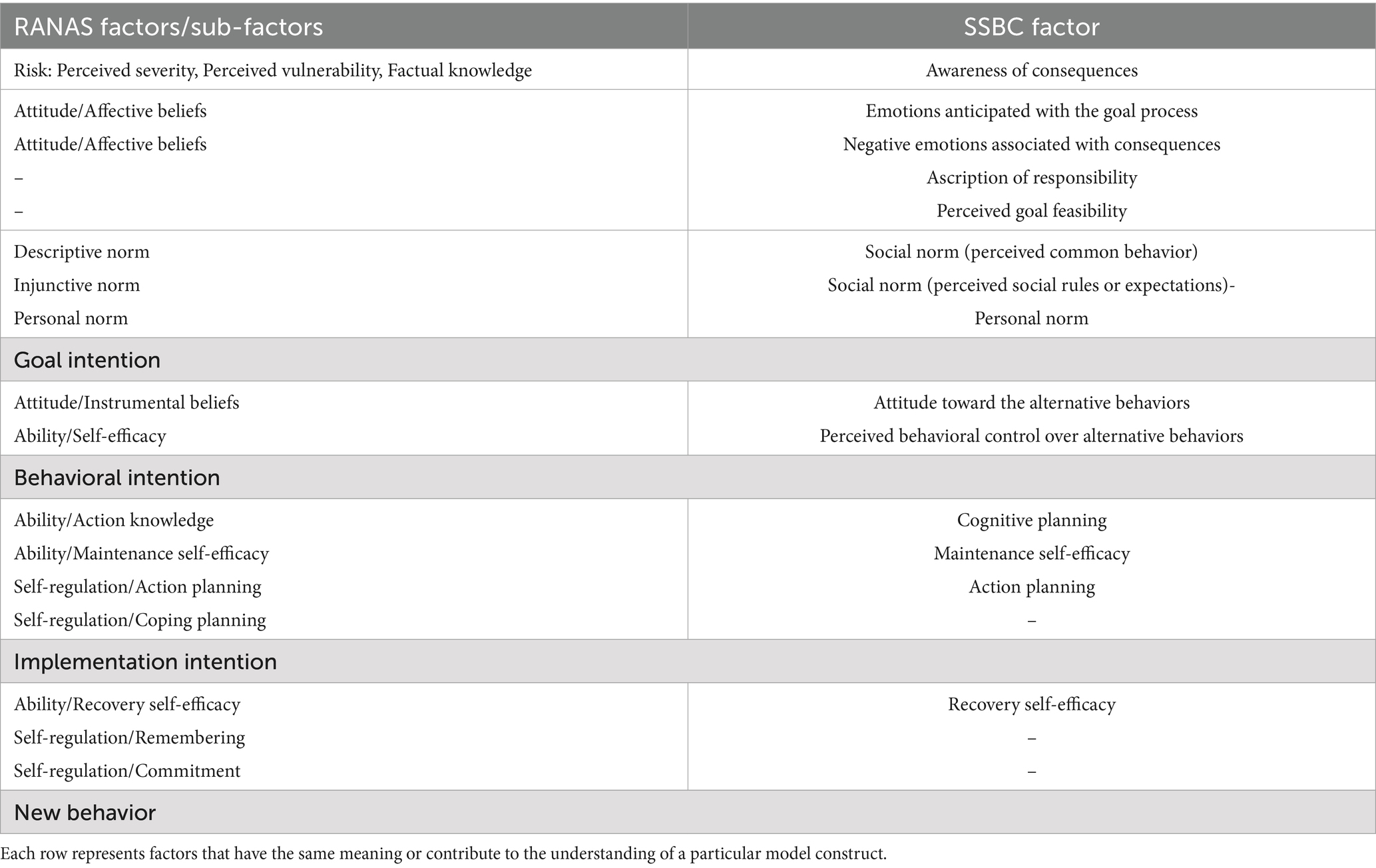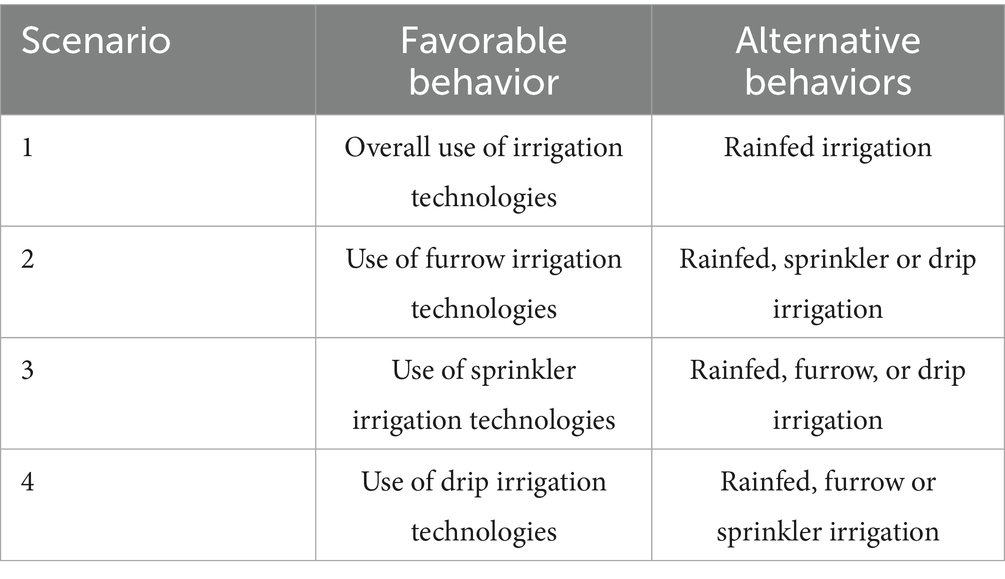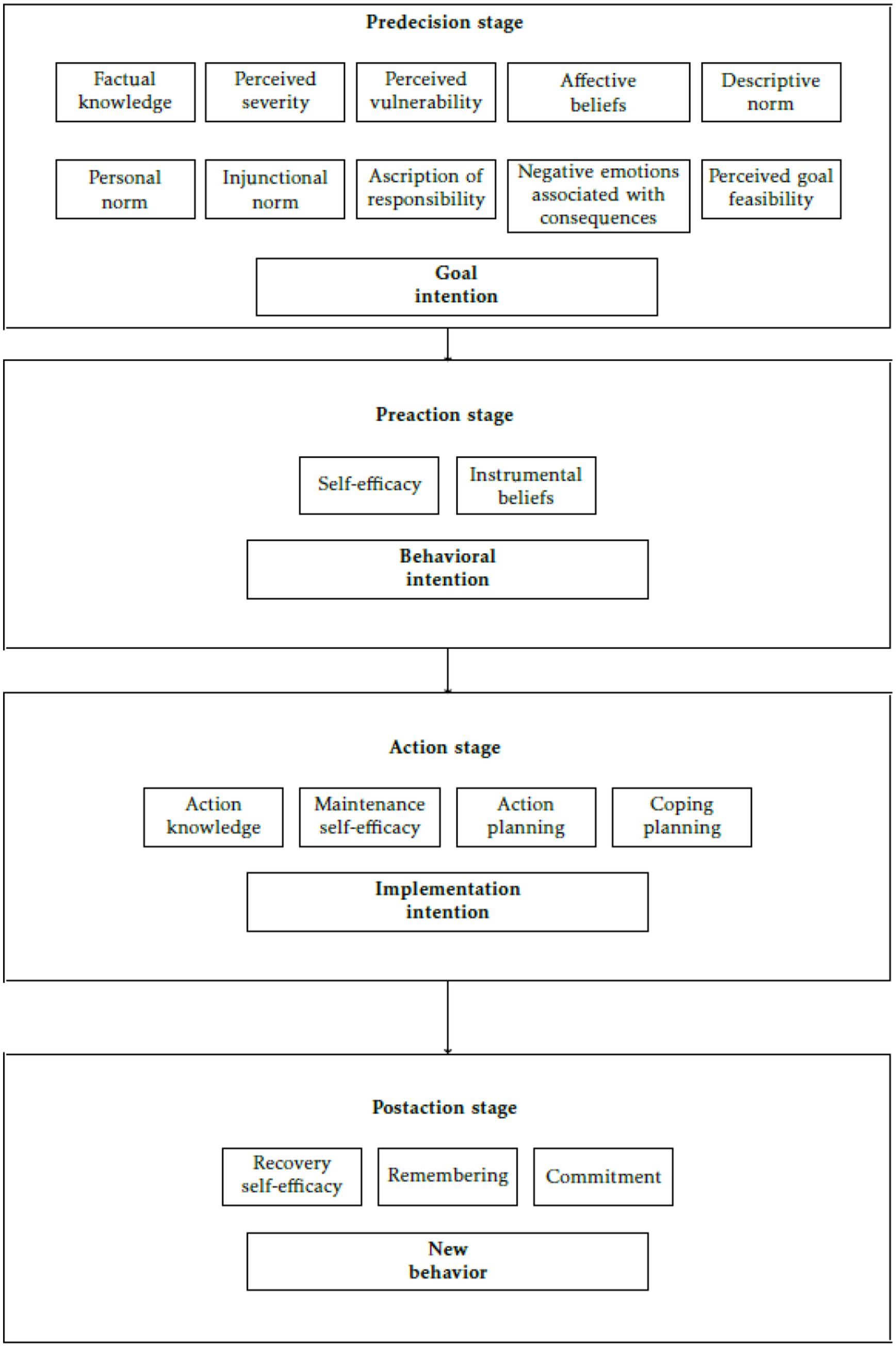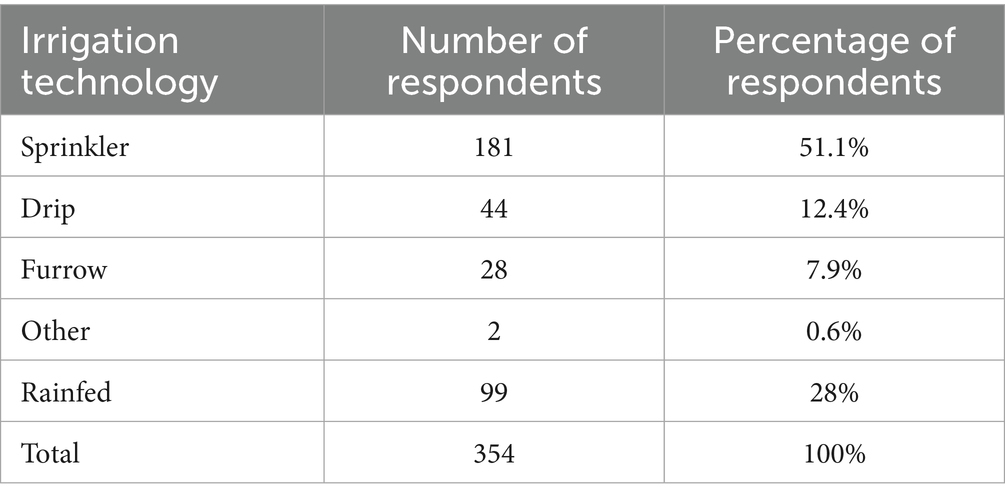- 1Department of Water Management, Delft University of Technology, Delft, Netherlands
- 2Faculty of Technology, Policy, and Management, Delft University of Technology, Delft, Netherlands
Farmers in Maharashtra, India, face water scarcity, leading to poor crop yields and farmer indebtedness. To improve water use efficiency and mitigate climate change impacts on livelihoods, governments promote micro-irrigation technologies. Still, the rate of adoption of these technologies remains low. This study aims to develop a complete overview of the socio-economic, psychological and contextual factors that influence adoption in a drought prone region of Maharashtra by combining two well-known models for understanding behavior, the RANAS model and the SSBC model. Our analysis used a mixed method approach. First, a logistic regression was made, using survey data from 419 farming households covering socio-economic and individual-level psychological factors from the RANAS-model. In addition, 22 qualitative semi-structured interviews were held to explore contextual, social, and personal-level factors, using insights from the SSBC model. The results show that farmers who are concerned with the availability of their water source and believe that getting water is becoming more difficult may not adopt micro irrigation systems. Prevalent norms influence farmers actions and choices. Strong financial abilities and technical skills are important drivers of the adoption of micro irrigation systems, in addition to the confidence in their abilities to buy and maintain them. Farmers who adopt micro irrigation systems are often more well-off than farmers adopting furrow irrigation systems and their ability to invest outweighs the importance of saving water through the adoption of efficient micro irrigation systems. Finally, we find that tremendous efforts, high uncertainty of the process of getting a micro-irrigation subsidy, combined with low trust in the government in the area, and feelings of unfairness negatively influence farmers and discourage them to adopt micro-irrigation. Taken together, our mixed-methods approach led to a more nuanced, technology-specific understanding of irrigation technology adoption beyond existing studies, offering valuable insights for designing more effective behavior change strategies and possible ways to encourage the adoption of water efficient irrigation technologies.
1 Introduction
India’s rural population comprises about 64% of the total population. Forty-three % of its workforce is employed in agriculture (World Bank, 2022a,b). Notably, smallholder farmers constitute 86.2% of all farmers in India (Bisht et al., 2020). Cotton is an important crop, with Maharashtra being the highest cotton producing state (Khadi et al., 2010). However, cotton cultivation is a challenge due to inefficient water use, drought-proneness of the region, and a rising variability in rainfall patterns due to climate change (Rahman et al., 2020). Farmers compete for limited water resources, leading to unpredictable crop yields and quality and impacting farmers’ livelihoods (RVO, 2022). These challenges result in reduced income and debts, especially in the Vidarbha region, where approximately 95% of farmers are reported to be in debt (Dongre and Deshmukh, 2012). This indebtedness is due to a complex interplay of social, political and environmental factors and has arguably led to high rates of farmer suicides (den Besten et al., 2016; Dongre and Deshmukh, 2012).
One approach toward improving livelihoods in agriculture is to enhance productivity and promote climate-resilient practices. Micro irrigation can enhance water use efficiency in crop production and modernize agriculture (Lee et al., 2016; Ahmad and Hasanuzzaman, 2020). For instance, sprinkler irrigation and drip irrigation systems can irrigate plants in the same amount of time as furrow irrigation systems, while using less water (Venot et al., 2017).
Although micro-irrigation systems have shown high efficiencies, and despite efforts to promote them, adoption among farmers in Maharashtra remains low (Nair and Thomas, 2022). Out of the total cultivated area of Maharashtra, only 17% is irrigated (ICAR, 2024). Different factors may be responsible for this, including both socio-economic, environmental, and institutional factors, also called contextual factors, and psychosocial factors (Nair and Thomas, 2022; Pathak et al., 2019; Nair and Thomas, 2022; Balasubramanya et al., 2023; Hatch et al., 2022; Sikka et al., 2022). Combining contextual and psychosocial factors may provide the most complete insight into farmers’ decisions. For example, education, access to information, financial support, positive attitudes toward technology adoption, risk aversion to water scarcity, and norms have been used to explain irrigation adoption (Namara et al., 2007; Jordán and Speelman, 2020; Castillo et al., 2021; Hatch et al., 2022; Gautam et al., 2024).
The RANAS model is one model that assesses psychosocial factors influencing behavior. It is based on a range of health psychology theories and encompasses five blocks of factors: Risks, Attitudes, Norms, Abilities, and Self-regulation (Mosler, 2012). It has been used to explore various behaviors, including the adoption of household water treatment, water reuse systems and irrigation technology (Contzen and Marks, 2018; Callejas Moncaleano et al., 2021; Contzen et al., 2023).
The RANAS model treats decision-making as a single stage process. Yet, technological adoption has also been conceptualized as a multi-stage behavioral change process, influenced by different psychosocial factors and attitudes (Weersink and Fulton, 2020). The stage model of self-regulated behavior change (SSBC) (Bamberg, 2013) identifies four stages of behavioral change—pre-decision, pre-action, action and post-action—that result in formation of goal intention, behavioral intention, implementation intention, and, ultimately, new behavior. The SSBC model has been used in environmental psychology to explain technology adoption (Keller et al., 2019). The factors included in SSBC differ partly from those in the RANAS framework, and combining the factors from the two frameworks and linking them to different stages of behavior change can potentially result in the most complete and nuanced understanding of adoption behavior.
There are currently no studies that explore irrigation technology adoption as a multi-stage behavioral change process. To fill this gap and investigate the factors influencing adoption, the RANAS and SSBC models were combined using a mixed-methods approach. Mixed-method approaches combine quantitative methods that are typically very structured and deductive with qualitative methods that are more flexible and inductive (Shibly et al., 2022). Quantitative methods are often based on the idea that the world can be objectively measured (Lincoln and Guba, 1985). Qualitative methods, on the other hand, often assume that reality and meaning are subjective and socially constructed. They examine words and actions through in-depth investigation to develop contextualized and interpretive perspectives (Creswell and Miller, 2000), using data collected via semi-structured or unstructured interviews, field notes, focus groups, and participant observation (Hesse-Biber and Leavy, 2004). They can discover inductively factors not considered a priori by behavioral models such as RANAS or SSBC. Quantitative and qualitative approaches can both explain behavior up to a point, and combining them can provide a richer, more complete insights into technology adoption.
To summarize, the objectives of this study were to:
1. Identify the psychosocial factors influencing irrigation technology adoption using surveys in the Vidarbha region (Maharashtra, India) based on the RANAS model and socio-economic household data (defined here as a single stage model).
2. Explore the contextual and psychosocial determinants of irrigation technology adoption through qualitative, open-ended interviews, informed by the Stage model of Self-regulated Behavioral Change (SSBC).
3. Reinterpret the survey results by integrating insights from the interviews to provide a comprehensive, complementary perspective on irrigation technology adoption.
2 Materials and methods
2.1 Study area
The study focused on the Vidarbha region in eastern Maharashtra, India, which is predominantly semi-arid (Aher and Yadav, 2021). Van Wirdum et al. (2019) provides a comprehensive description of this area, covering geology, hydrology, climate and agricultural practices. Maharashtra’s geology is characterized by igneous basaltic aquifers that store water only in secondary permeable structures, such as fractured spaces, which limits groundwater availability. The four major rivers—Narmada, Tapti, Godavari, and Krishna—are non-perennial and monsoonal. Annual average rainfall is around 700 mm/year in the drought prone parts (Nair and Mirajkar, 2021). Rainfall occurs primarily during the summer monsoon season (June to September), which is also the period during which cotton, the main cash crop in the Vidarbha region, is grown. Ninety percentage of Maharashtra’s cotton cultivation is rainfed (Blaise, 2017; Ministry of Textiles, 2022), requiring 700–1,200 mm annually (van Wirdum et al., 2019; Hussain et al., 2020). The lack of supplemental irrigation, among other factors, often leads to severe agricultural distress (Pande and Savenije, 2016).
Four districts within Vidarbha were selected for the study: Amravati, Nagpur, Wardha and Yavatmal (Figure 1).
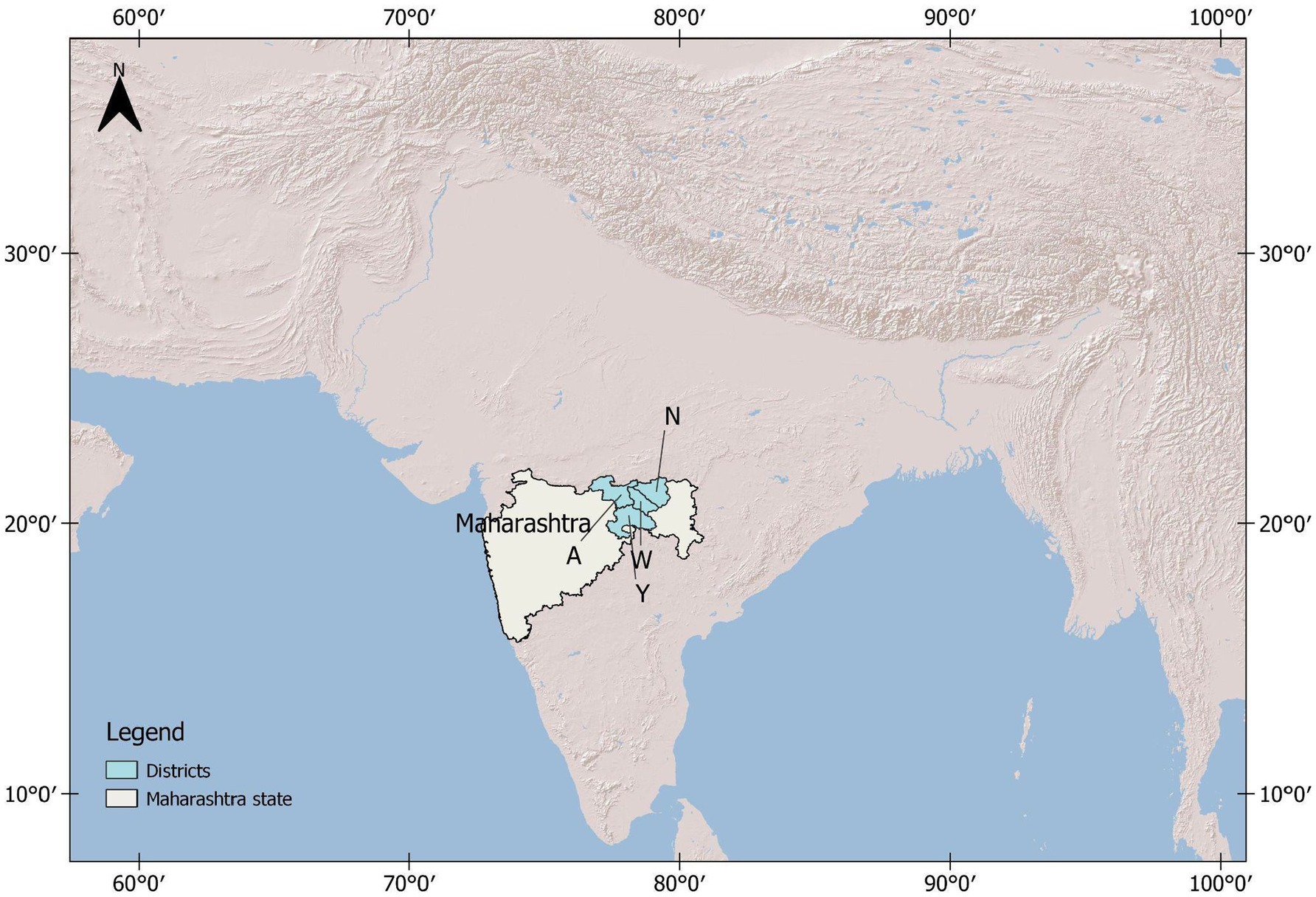
Figure 1. Study area in Maharashtra (highlighting 4 districts with their initial letters) and the location of the study area within India. A, Amravati; N, Nagpur; W, Wardha; Y, Yavatmal.
2.2 Theoretical frameworks to describe the behavioral determinants
2.2.1 Risk, attitude, norms, ability, self-regulation model
The Risk, Attitude, Norms, Ability, and Self-regulation (RANAS) model evaluates factors driving human behavior to help design strategies for behavior change in specific populations (Mosler, 2012). As the name suggests, RANAS comprises five blocks of factors: risk, attitude, norms, ability, and self-regulation.
Risk factors include “perceived vulnerability,” “perceived severity,” and “factual knowledge.” In the context of our study, risk can be translated as the danger of inadequate water for agriculture. Perceived vulnerability then refers to the perceived water scarcity, perceived severity to the perception of its consequences, and factual knowledge to (knowledge of) potential yield losses.
Attitudinal factors reflect positive or negative views toward new behaviors, such as adopting new irrigation technologies, including instrumental beliefs about costs and benefits (Mosler and Contzen, 2016). They also have an affective beliefs component, which involves feelings associated with the behavior (Mosler, 2012).
The norm factors comprise “descriptive norms,” referring to the perceptions of other people’s behavior; “injunctive norms,” referring to social approval or disapproval; and “personal norms,” referring to individual beliefs about what should be done (Cialdini et al., 2006; Schultz et al., 2007). Human beings are social animals and tend to align their personal norms with what they perceive as normal and socially acceptable.
Ability factors involve “action knowledge,” “self-efficacy,” “maintenance self-efficacy,” and “recovery self-efficacy.” Self-efficacy refers to the confidence in performing a behavior, which requires knowledge about the action and personal skills and competencies (Locke, 1997; Frick et al., 2004). Maintenance self-efficacy refers to the ability to overcome obstacles, and recovery self-efficacy refers to the ability to recover from setbacks (Schwarzer, 2008).
Self-regulation factors, described by Albarracín et al. (2005), ensure the behavior’s maintenance. They help manage conflicting goals and distractions during behavior change (Bandura, 2004; Albarracín et al., 2005; Schwarzer, 2008). They include “action control” (ongoing assessment of behavior) and “action planning” (identifying when, where, and how to execute the behavior) (Gollwitzer and Sheeran, 2006). “Coping planning” involves anticipating barriers and overcoming them (Schwarzer, 2008). Maintaining behavior also requires “remembering” the behavior and “commitment” toward it (Tobias, 2009).
Interventions in the RANAS approach may target one or more blocks of factors.
2.2.2 Stage model of self-regulated behavior change
According to the SSBC model (Bamberg, 2013), behavior change is a goal-oriented process occurring in four stages: predecisional, preactional, actional, and postactional (Keller et al., 2019). The different stages are concludes with specific intentions—goal intention, behavioral intention, and implementation intention—and the last stage with new behavior. These stages are inspired by the model of action phases (MAP) (Heckhausen and Gollwitzer, 1987), the norm-activation model (NAM) (Schwartz and Howard, 1981) and the Theory of Planned Behavior (Ajzen, 1991). The SSBC assigns the relevant psychological constructs to specific stages to enable more targeted behavioral analysis and intervention design.
Figure 2 provides a conceptual diagram of the SSBC model (Bamberg, 2013). In the predecisional stage, farmers reflect on their practices and goals. Perceived consequences of their practices and personal responsibility for these consequences, together with social norms, lead to the activation of personal norms. Combined with perceptions of feasibility, these personal norms lead in turn to a goal intention, e.g., to increase productivity or profitability. In the preactional stage, the behavioral intention is shaped, e.g., to adopt drip irrigation. This is the result of, on the one hand, the goal intention, and on the other, attitudes toward alternate behaviors and perceived behavioral control. In the actional stage, the behavioral intention is translated into a concrete implementation intention. Farmers specify when and where to act and plan for potential challenges. In addition, they need confidence in maintaining the behavior once started, which in SSBC is called maintenance self-efficacy. Finally, in the “postactional stage,” farmers show new behavior, e.g., they use drip irrigation. This requires persistence of the new behavior despite setbacks or, in SSBC terms, recovery self-efficacy.
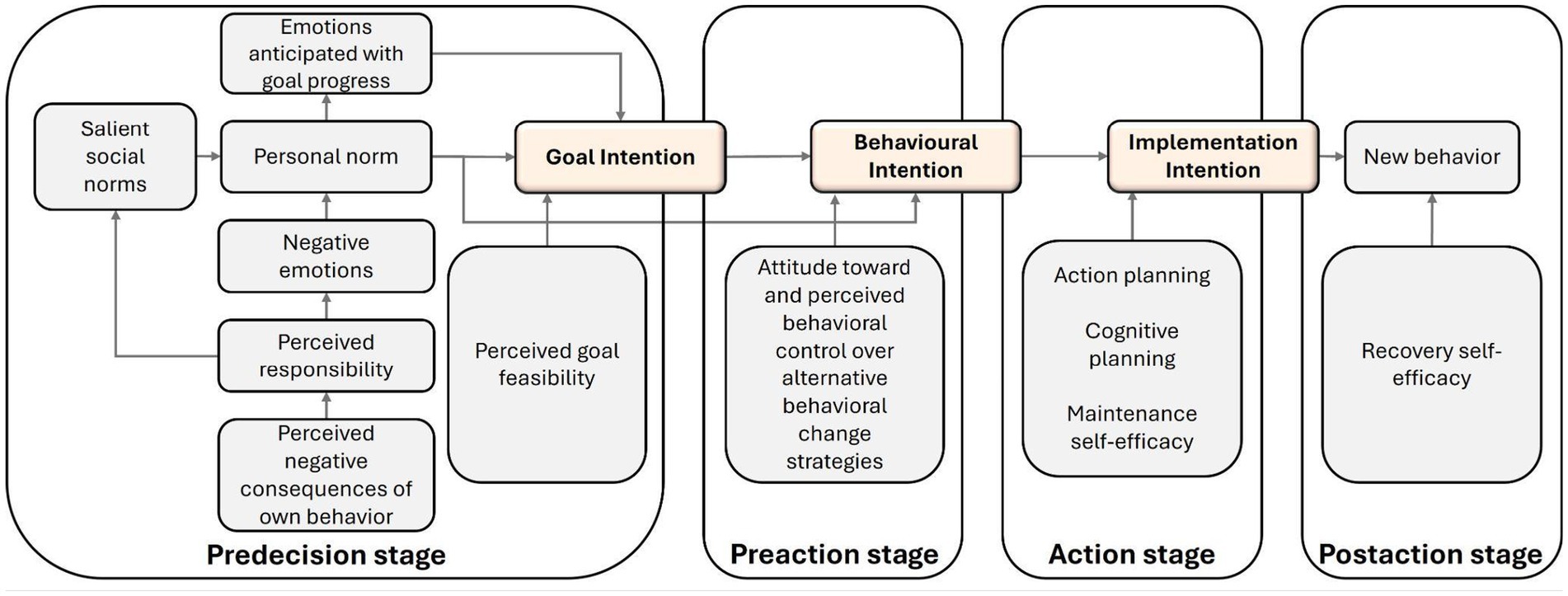
Figure 2. Conceptual model of the stage model of self-regulated behavioral change, SSBC (Bamberg, 2013).
Despite of their differences, RANAS and SSBC have much in common, due to their shared psychological foundations rooted in theories such as the Theory of Planned Behavior, Social Cognitive theories and self-regulation theories. In this study, the RANAS factors were mapped onto the different stages of the SSBC model using factor pairing. Factors with similar meanings were identified, retaining the unique factors from either model, and combining them into an integrated list of factors (Table 1). The results of the mapping are presented in section 3.1.
2.3 Mixed-methods approach
The mixed-methods approach was selected based on the research objective of understanding both quantitative determinants and qualitative insights related to irrigation technology adoption. Given the complexity of technology adoption as a multi-stage behavioral process (Weersink and Fulton, 2020), relying solely on quantitative data may lead to overlooking nuanced factors influencing farmers’ decisions. A structured survey based on the RANAS model measured key psychosocial and contextual factors, while semi-structured interviews informed by the SSBC model explored decision-making processes over time and helped identify contextual barriers that structured surveys might not capture.
2.4 Quantitative method: structured household surveys (n = 419)
Data on irrigation technology adoption were gathered through a structured household survey based on the RANAS model (Adla et al., 2024). In 2019, an intervention started by the Solidaridad Network Asia Limited engaging 20,000 farmers to promote water-efficient cotton production through training on organic farming and sustainable water use (RVO, 2022). For the survey among these 20,000 farmers, Krejcie and Morgan (1970) formula suggested a sample size of 377 for a 95% confidence level. To enhance representativeness, the sample was increased to 419. Structured, standardized face-to-face interviews were conducted in Marathi by trained fieldwork personnel and later translated into English. Random sampling was used to identify the participants with the inclusion criteria that they cultivated cotton. For more details readers are referred to Adla et al. (2024).
The survey collected self-reported data on farmers’ socio-economic characteristics, farming practices, financial aspects, and psychosocial factors as defined by the RANAS model. Supplementary Table A1 provides the operationalized RANAS variables and questions that were included in the survey (described further in Adla et al., 2024). Supplementary Table A2 lists the data types of the socio-economic and psychosocial RANAS variables. Some were operationalized via more than one survey question/construct to ensure stability of measurement. Responses to psychosocial questions were scored on an ordinal Likert scale (from 1 to 5), while socio-economic factors were scored on nominal or ordinal scales.
The methodology was based on a protocol developed to conduct RANAS-based sociohydrological surveys (Adla et al., 2023). Ethics permission was duly obtained from the Human Research Ethics Committee of the Delft University of Technology (Netherlands) to ensure compliance with the ethical standards related to the collection, processing, and storage of Personally Identifiable Information, such as names, and Personally Identifiable Research Data. Informed consent procedures were followed, ensuring that participants understood the research purpose, their role and their rights, including the right to withdraw at any time. Before data collection, participants consented to their voluntary participation and understanding of the confidentiality measures in place.
2.4.1 Analysis of the survey data
The survey data were analyzed to provide insights into the contextual and RANAS psychosocial factors influencing irrigation adoption behavior through logistic regression analysis. Four scenarios were defined to analyze factors relevant to the adoption of different irrigation systems: sprinkler, drip, furrow, and all irrigation systems combined. The primary focus was on micro irrigation systems (sprinkler and drip), with the other scenarios for checking the consistency of influential factors.
Logistic regression models were developed and trained for data corresponding to each of the four scenarios to determine the contextual and RANAS factors that could explain the irrigation adoption behavior of farmers. Each model used the same independent variables but altered the dependent variable. The first model examined factors influencing the overall uptake of irrigation systems, distinguishing between farmers who depend solely on rainfall and those who do not. The second model focused on the adoption of furrow irrigation systems, distinguishing between traditional furrow users and those with rainfed or micro irrigation enabled farms. The third model explored factors influencing the adoption of sprinkler systems, and the fourth model looked at drip irrigation systems.
Creating four scenarios provided a deeper understanding of the factors influencing the adoption of different irrigation systems while addressing the challenge of analyzing multiple behavioral alternatives. Although all related to irrigation, these alternatives are distinct behaviors due to the diverse characteristics of each technology (Hatch et al., 2022). This approach allowed for a comparative analysis of factors across different irrigation technologies and prevented over-generalizing the results.
2.4.2 Binary logistic regression analysis of the survey data
The aim was to identify variables that explain the adoption or non-adoption of an irrigation system, the dependent variable. Socio-economic and RANAS factors were included as independent variables under the assumption that they were influential toward irrigation adoption behavior. The RANAS factors were included at the sub-factor level as listed in Supplementary Tables A1, A2.
Four models were created, each tailored to a specific irrigation system as the behavioral outcome as defined in Table 2. The possible outcomes for each model were “yes” (using an irrigation system) or “no” (not using an irrigation system). As outlined in Figure 3, binary logistic regression was used to estimate the probability of the dependent variable belonging to a class (“yes” or “no”) based on independent variables (contextual and RANAS factors) (DeMaris, 1995). By setting a threshold, this probability converts to a binary outcome (0 or 1), aiding in decision-making (Bruce et al., 2020).
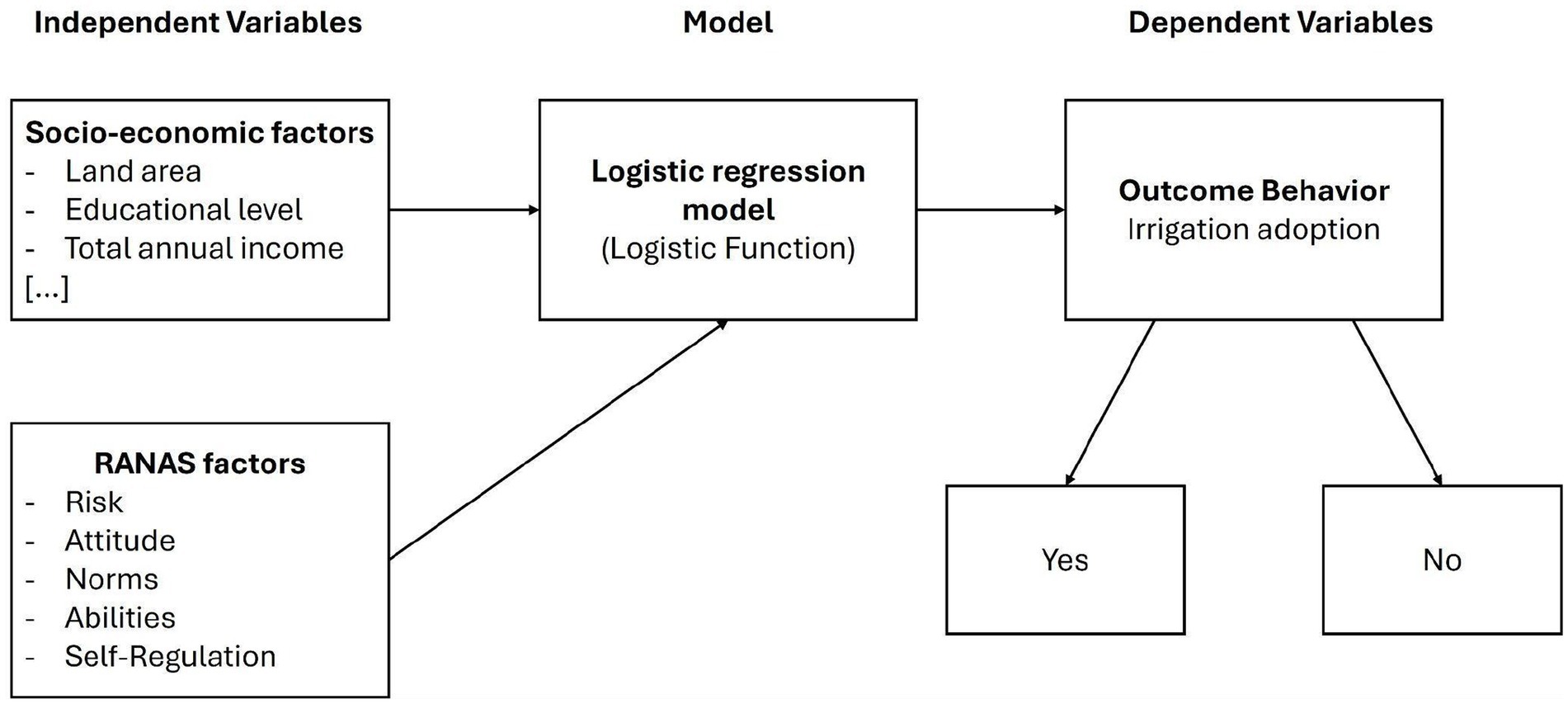
Figure 3. Conceptualizing the logistics regression model with independent variables (socioeconomic and RANAS factors) as inputs and the dependent variable (irrigation adoption) as the output.
The relationship between the outcome and predictors was modeled with a logistic function, transforming the weighted sum into a probability (Kumar and Rath, 2016). The odds represent the probability of an event occurring divided by the probability of it not occurring (Murat, 2023). Changes in predictors affect the odds ratio, demonstrating the impact of each variable (Kumar and Rath, 2016). The logistic regression model’s outputs were logits (log-odds).
Changes in the outcome in the logistic regression model are usually reported per one unit change of the independent variable. However, the independent variables were scaled in data preprocessing, transforming them to z-scores with a mean of 0 and a standard deviation of 1. This scaling allowed for better understanding of variables with different units and scales. Consequently, the reported changes corresponded to one standard deviation change in the original variable.
These regressions were conducted using a Python code. Model assumptions and details are provided in Šaponjić (2023) and Adla et al. (2024), and also included in Supplementary Appendix B.
2.5 Qualitative method: semi-structured interviews (n = 22)
Semi-structured interviews provided more context and perspective to the regression analysis results from the household surveys. They involved personal interactions and follow-up questions, allowing participants to open up and share more diverse and unique information (Hammer and Wildavsky, 2018). This approach was used to accompany the results of the regression analysis based on the RANAS model for three reasons:
a) to check whether the statistical significance factors were recognized in practice
b) to add the dynamic character of the SSBC model and the SSBC factors missing from the RANAS model to the analysis
c) check for important additional factors missing from both the RANAS and the SSBC model a.
2.5.1 Interview design and protocol
Semi-structured interviews with open-ended questions were used to gather information about farmers’ socio-economic profiles and their farming practices. The interviews guideline was designed taking into account the results from the factor pairing (sections 2.2.3 and 3.1) and regression analysis, resulting in a list of seed questions. Whereas the seed questions were the same across interviews, the follow-up questions were adjusted and differed per respondent.
Participants were recruited using snowball sampling, a technique where initial participants (“seeds”) suggest other potential participants (Parker et al., 2019; Leighton et al., 2021). Farmers from the study area were contacted, and they referred additional farmers for interviews. The aim of the interviews was to obtain detailed insights into a wide range of farming situations and not statistical generalization, hence the depth of the interviews and the situations were covered were more important than the number of interviews. In total, 20 farmers were interviewed, as well as two key informants.
The interviews were held face-to-face and were conducted by the first author in English with occasional support by field staff who facilitated translation to/from Marathi. Interviews were recorded, transcribed manually, and summarized for qualitative data analysis. The questionnaire is reported in Supplementary Appendix C. At the beginning of each interview, informed consent was obtained verbally from the participant.
2.5.2 Interview analysis
Interviews were analyzed through qualitative coding (Castleberry and Nolen, 2018), using both inductive (unstructured) and deductive (structured) approaches. The deductive approach applied the factors that resulted from the mapping of the RANAS and SSBC models to the transcripts. The inductive approach identified additional relevant factors reported by farmers that did not match either of the two models nor the existing literature. The deductive analysis validated the regression results, while inductive analysis revealed nuanced and unexpected findings, including additional—predominantly contextual—factors influencing micro irrigation adoption. These insights complemented the results obtained from the regression modeling.
2.6 Mixed method: comparison of survey and interview results
The regression modeling aimed at identifying factors influencing the adoption of a certain irrigation technology, taking a factor-loading approach based on the RANAS model. The qualitative interviews complemented the findings from the regression analysis and served to enrich the interpretations by validating and expanding upon the RANAS factors included in the regression analysis for real-world relevance. This analysis assessed whether factors identified as statistically significant in regression were also recognized in interviews as influential. This included factors mentioned in both datasets, factors that were significant during regression but not highlighted in interviews, and those that were relevant in interviews but were not significant in the regression modeling. This mixed-methods approach thus helped to ensure robustness in understanding factors affecting the adoption of micro irrigation systems.
3 Results
3.1 Mapping of RANAS and SSBC factors
Figure 4 provides the result of mapping the RANAS factors onto the SSBC stages and combining them with the SSBC factors. The SSBC framework is often more comprehensive, particularly for factors like “Ascription of responsibility,” “Negative emotions associated with consequences,” and “Perceived goal feasibility.” In contrast, the RANAS framework is more comprehensive in the case of “Coping planning.” Some factors are differentiated in RANAS and lumped into one or a few constructs in the SSBC framework. For instance, the RANAS framework provides 3 sub-factors to assess “Risk” and 4 sub-factors for “Norm,” both of which are attributed to the pre-decision stage. The SSBC also considers 7 sub-factors, yet building on different psychological theories, these overlap only partially. Supplementary Table D1 details the factor-wise pairing between RANAS and SSBC factors.
3.2 Quantitative analysis: results of the farmer household survey
The survey initially gathered data from 419 respondents. After excluding entries with missing values (n = 63) and outliers with annual incomes beyond three standard deviations from the mean (n = 2), the final dataset comprised 354 respondents. The following analyses are based on these data points.
3.2.1 Descriptive statistics of RANAS survey
Of the analyzed respondents, 348 identified as male and 6 as female. The average age was 49 years (SD = 13 years), ranging from 21 to 80 years. The majority of the farmers completed education up to the tenth or twelfth grade (at the age of about 18 years). On average, they owned 6.55 acres of land (SD = 7.51 acres) and earned an annual income of INR 284,042 (SD = INR 273,285). They typically owned three livestock animals (cows, goats, or bulls). Nearly a third of the farmers (99) relied solely on rainfall without using any irrigation technology. Among those using irrigation systems, 71% (181) employed sprinkler systems, 17% (44) drip systems, 11% (28) furrow systems, and less than 1% other types of irrigation systems. Table 3 illustrates the distribution of irrigation technologies among farmers, highlighting the predominance of sprinkler systems.
Table 4 displays the descriptive statistics (mean and standard deviation) for the RANAS sub-factors that were rated using a Likert scale from 1 to 5. A score of 1 is expected to have the most negative effect on adoption and a score of 5 the most positive effect.
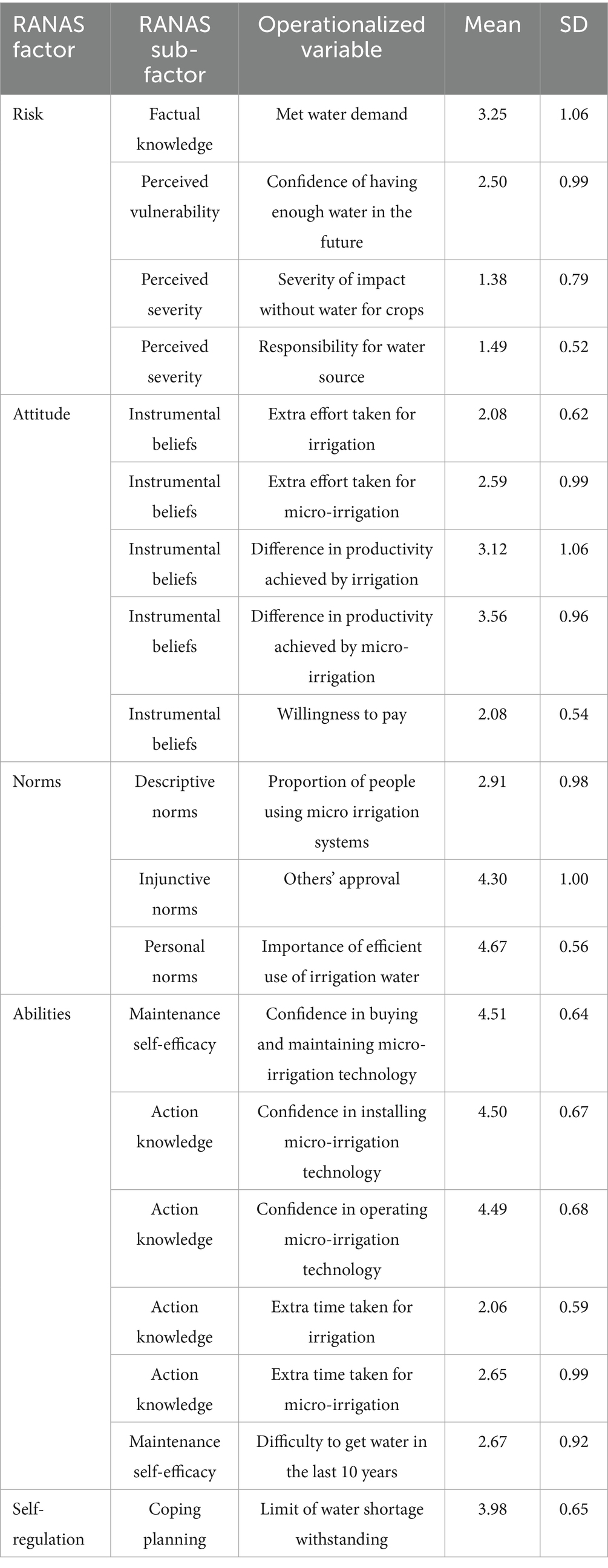
Table 4. Descriptive statistics (mean and standard deviation, SD) of the RANAS factors (sub-factors) and their operationalization through the respective variables used in the survey.
Farmers expressed confidence that their current water supply meets their needs. However, they were concerned about future water supply and the consequences for their crops. They also held themselves responsible for managing their water sources. Regarding attitudes toward irrigation, they believed they had to put more effort into irrigation, but they did not expect significant yield increases. They were willing to contribute a small amount toward the cost of adopting irrigation systems on their farms, the remainder having to be covered primarily by subsidies. In terms of norms, farmers perceived that a considerable proportion of other farmers were already using irrigation systems. Water conservation in irrigation practices was highly valued as a personal norm. Farmers were confident in their ability to buy, maintain, install, and operate micro irrigation systems. They perceived that using irrigation requires more time than rainfed agriculture, but micro irrigation only a little bit more than furrow irrigation. Farmers did not find it increasingly difficult to obtain water for farming over the past decade. In the event of a water shortage, they estimate they could withstand a crop loss of 25%.
3.2.2 Logistic regression based on quantitative survey
The results of the logistic regression are presented in Table 5. They include statistically significant regression factors that are likely to have a real effect (Bruce et al., 2020) at a confidence level of α= 0.05. Each significant contextual and RANAS factor is listed in the “Independent variable” column and its respective impact by the regression coefficient estimate (β), odds ratio (OR), p-value, and percentage (%) change in the likelihood of adoption for a change of a standard deviation in the factor. The percentage change was calculated as (OR − 1) * 100 [%] and is positive for positive β estimates. The goodness-of-fit measure for each model is indicated by its pseudo R2 value. The complete regression tables are provided in Supplementary Appendix E.
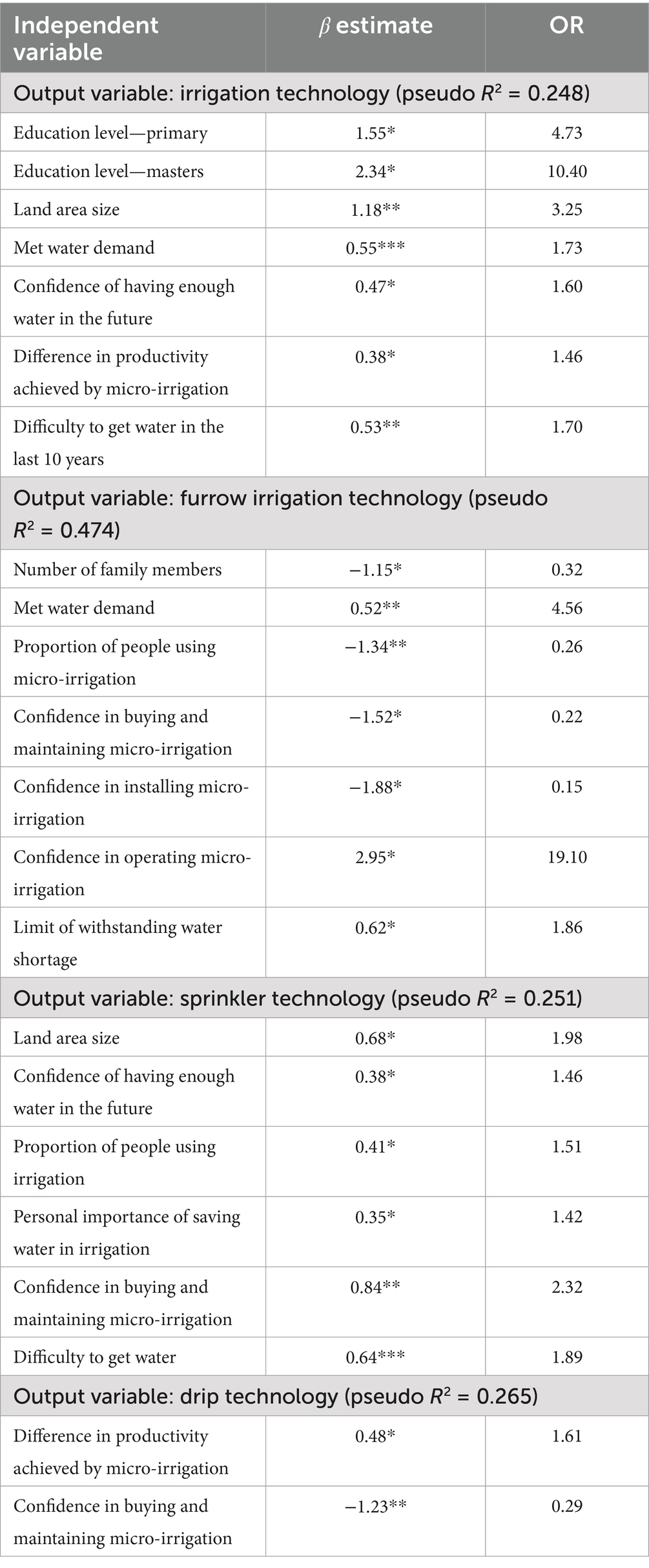
Table 5. Logistic regression results for different output variables listing significant explanatory factors along with the respective estimates of the regression coefficient (β), Odds Ratio (OR), and significance indicated in the following manner: ***p< 0.001, ** p < 0.01, *p < 0.05.
The Odds Ratios of the different independent variables in Table 4 can be interpreted as a percentage change in the likelihood of the output—use of irrigation or a specific irrigation technique—per unit change in the variable. In case of RANAS factors using the 5 point Likert scale, a unit change means a one point higher or lower score on this scale. For education, one unit means change compared to no education, and for land area, one unit is the range of land sizes in the study area.
For overall irrigation adoption, education level and land area size significantly explained adoption. Higher education levels and larger farming areas increased the likelihood of adoption by 940.3 and 225.5%, respectively. In other words, the likelihood of adoption increased approximately 9 fold and 2 fold when education level increased from no education at all to masters level from no education and land area increases by 1 unit. The former shows one multiplier effect of adopting new practices when investments in higher education are made while the latter shows the need to irrigate is larger when land sizes are larger. To promote early adoption of irrigation technologies, larger and better educated farmers should be targeted.
Additionally, a 1 point higher scores on the perceived severity of and vulnerability to water scarcity and climate change risks led to a 72.9 and 59.8% higher likelihood of adoption. Hence, it is easier to convince farmers who perceive water and climate insecurity to adopt irrigation than farmers who do not. A 1 point increase in the belief on increased productivity from micro-irrigation increased the likelihood of adoption by 46.1%. Furthermore, a 1 point increase in a stronger recovery self-efficacy increased the likelihood of adoption by 70.4%.
The likelihood of adopting furrow irrigation systems decreased by 68.3% per family member. A point less severe perception of water supply adequacy led to a 356.3% increase in the likelihood of adopting them. A 1 point higher perceived use of micro irrigation systems by others reduced furrow system adoption by 73.9%. Regarding abilities, a 1 point increase in the confidence in buying and maintaining micro irrigation systems lowered the likelihood of adopting furrow irrigation by 78.1%, and a corresponding increase in confidence in installing a micro irrigation system decreased it by 84.7%. However, a 1 point increase in confidence in operating a micro irrigation system drastically increased furrow system adoption by 1809%, demonstrating that confidence in operating plays such a large role that training and educating farmers to operate irrigation system should be an integral part of micro-irrigation interventions. A 1 point increase in coping planning, described by an increased limit of withstanding water shortage, led to an 86% increase in adoption likelihood.
Regarding the adoption of sprinkler irrigation systems, a unit larger land area size increased adoption likelihood by 98.4%. A 1 point reduction in the perception of vulnerability regarding future water availability resulted in a 46% increase in adoption likelihood. A 1 point increase in descriptive norms, reflected by a higher perceived proportion of people using micro irrigation systems, led to a 50.8% increase in the likelihood of adoption. A 1 point increase in personal norms emphasizing water conservation increased the likelihood of adoption by 42.2%. A 1 point increase in confidence in buying and maintaining micro irrigation systems increased the likelihood of adoption by 132.3%. Being able to maintain is similar in effect to the role of confidence in operating irrigation systems in its adoption. Lastly, a 1 point increase in the perception of easier access to water, reflecting strong recovery self-efficacy, increased the likelihood of adoption by 88.7%.
The adoption of drip irrigation systems was influenced by a limited number of factors, with none being socio-economic. A 1 point increase in the belief that micro-irrigation leads to gains in productivity positively influenced adoption, increasing the likelihood by 61.4%. Conversely, a 1 point increase in confidence in buying and maintaining micro irrigation systems decreased the likelihood of adopting drip systems by 70.9%.
3.3 Qualitative analysis: results of the semi-structured interviews
The interviews were analyzed via qualitative coding which considered the four stages of behavior change and habituation. The results are outlined below, with the number of interviews where each factor was identified in brackets. Table 6, lists all identified factors and their corresponding stages, and the interview numbers. Summaries of the interviews and the coding scheme are provided in Supplementary Appendix F.
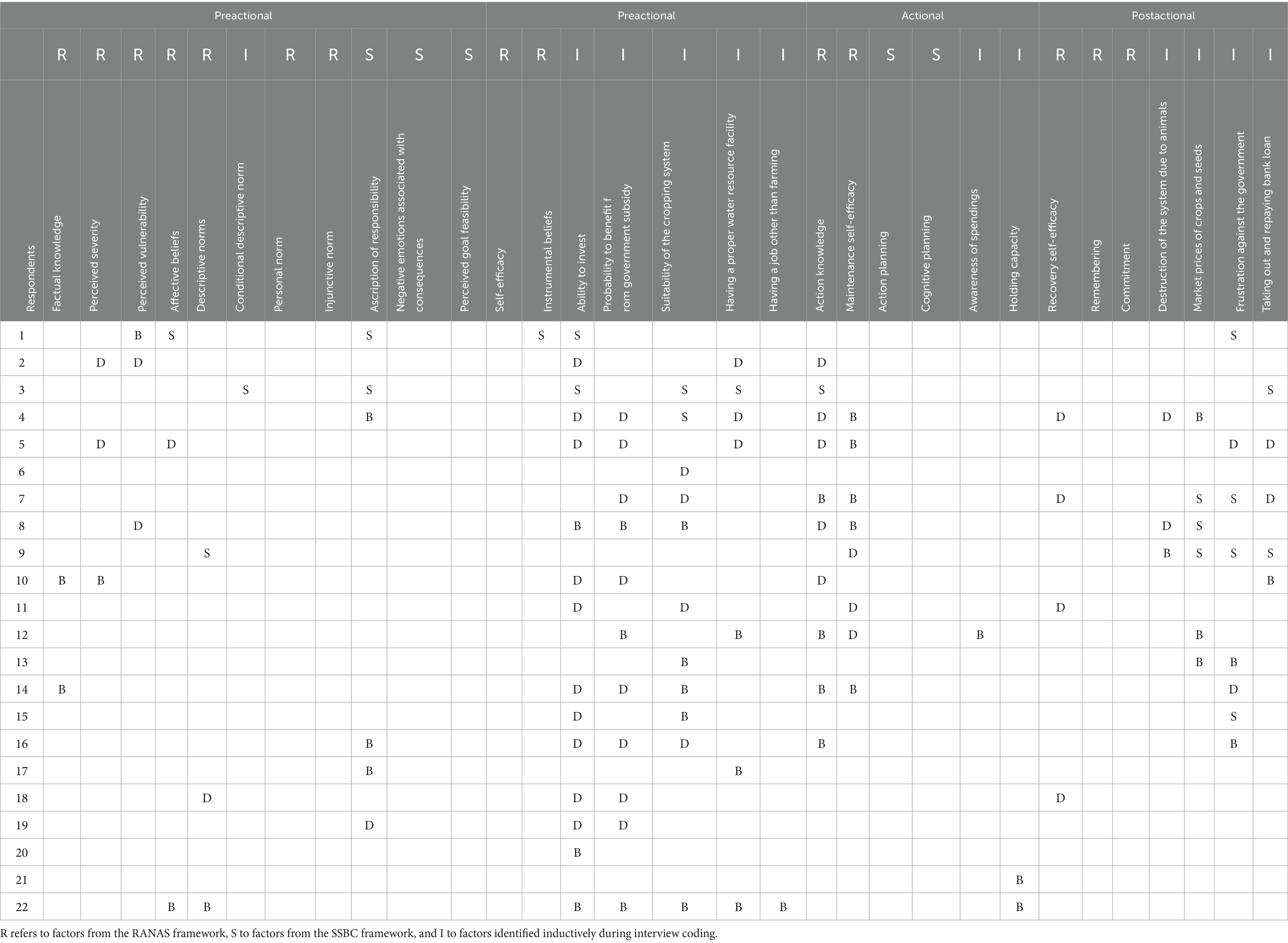
Table 6. Factors identified in the different interviews with respect to drip irrigation (D), sprinkler irrigation (S) or both (B).
3.3.1 Predecision stage
In the pre-decision stage, farmers need to form a goal intention to proceed to the next stage (Keller et al., 2019). Farmers expressed various goal intentions regarding their farming practices, such as higher water use efficiency, crop diversification, labor reduction, prevention of crop damage, and overcoming the impacts of untimely rainfall.
Farmers believed that the goal of increasing water use efficiency (Van Halsema and Vincent, 2012), could be achieved by using both drip and sprinkler technologies. Similarly, farmers viewed both drip and sprinkler as acceptable technologies to overcome the unpredictable impacts of untimely rainfall on crop yields. To diversify crops and reduce financial risks, farmers preferred sprinkler technologies because of their larger coverage areas compared to drip irrigation, which would require crop-specific installations. For labor reduction, farmers sought to automate irrigation and apply fertilizers through fertigation using drip irrigation. To prevent crop damage, particularly from wild animals, and keep yields stable, farmers needed substantial financial resources for fencing.
Farmers with different goal intentions chose different methods to achieve them, with different relevant perceptive factors, each with distinct positive or negative impacts on their uptake. Several RANAS and SSBC factors had a positive influence on the adoption of both sprinkler and drip technologies. For instance, the RANAS risks factors and the SSBC factor on “Awareness of consequences” were mentioned. Farmers recognized the higher efficiency of micro-irrigation technology and their potential to address water scarcity. They were also aware of the negative impacts of climate change on agriculture. Farmers perceiving vulnerability to climate change and the incapability of traditional methods to ensure stable yields, reported that they intended to adopt micro-irrigation. Furthermore, farmers aware of the severity of the impacts of water scarcity wanted to start using micro-irrigation technologies. “Affective beliefs” and “Emotions anticipated with the goal process” was also a positive factor. Those who perceived positive feelings about irrigation technologies were more eager to adopt them. Descriptive and social norms also had a positive influence. Observing and acquiring skills from other progressive farmers encouraged micro-irrigation adoption. More specifically, farmers’ adoption of sprinkler technologies could be conditioned on observing neighbors benefiting from using these technologies. However, a low perception of personal responsibility and a high expectation of government support had a negative effects on adoption.
3.3.2 Preaction stage
Once farmers formed a goal intention, they developed a behavioral intention to achieve that goal. Their decisions to adopt micro-irrigation (i.e., both sprinkler and drip irrigation) were influenced by several factors. Farmers’ ability to invest in purchasing irrigation technologies was a major factor. In addition, the availability of government subsidy schemes encouraged adoption. Farmers who perceived that they could benefit from government subsidies were more motivated to implement micro-irrigation technologies than farmers who did not. The eligibility criteria for the government subsidy was the ownership of a water source, and hence farmers who had a water source were more likely to adopt. In terms of farm management, those who believed that a specific irrigation technology matched the needs of their crops were more likely to adopt it. Another factor was diversified incomes, since farmers whose livelihoods depended only on their agricultural activities could be more risk-averse toward adopting new technologies due to no financial buffer to mitigate the potential risk of failure due to the new situation. Finally, farmers who believed in the long-term benefits of irrigation technologies sprinkler irrigation would be more likely to invest efforts toward adoption.
3.3.3 Action stage
The factors crucial for forming implementation intentions for micro-irrigation adoption involved some factors common to the RANAS and SSBC models. The RANAS Ability factor “Action knowledge”/“Cognitive planning” had a positive influence on implementation intention. Knowledge of installing and maintaining systems drove adoption, and most farmers perceived that they had acquired these necessary skills by either owning these systems or working on other farms. Maintenance self-efficacy also had a positive influence. Farmers felt the need to have knowledge of maintaining the irrigation system, and this maintenance self-efficacy also included financial aspects. Sprinkler systems were sometimes favored more as less maintenance is required and maintenance costs are lower. Proper maintenance knowledge and skills, financial capacity for maintenance, and reliable electricity supply influenced adoption. High maintenance costs and bank loans negatively impacted maintenance self-efficacy. Beyond RANAS and SSBC factors, the awareness of spending was negatively associated with both drip and sprinkler irrigation. A lack of financial planning could lead to losses, reducing the farmers’ ability to sustain farms and their families. Further, storage capacity, i.e., the ability to store crops, was positively linked to micro-irrigation adoption as it allowed flexibility in selling produce at favorable market rates. Working with farmer groups (such as farmer producer companies) would also enhance this capacity and would bring benefits to individual farmers.
3.3.4 Postaction stage
The factors crucial for making the new behavior (adopting micro-irrigation technology) a habit involve the following factors. “Recovery self-efficacy” was positively associated with micro-irrigation adoption. Farmers realized that irrigation systems break down and those who were strong in dealing with failures and coping with relapse were able to fix them. Additionally, farmers would only continue to use the systems when they saw long-term benefits. The RANAS Self-Regulation factor “Commitment” positively influenced adoption as farmers who believed that hard work led to success committed themselves to attending to their crops. This was followed by a dedicated and consistent use of irrigation systems. Beyond RANAS and SSBC factors, the farmers’ frustration with the government negatively affected their motivations toward adopting irrigation systems. It also led to low trust in the government, leading to lowered hope in an improvement in their overall farming situation. Unfavorable market conditions, expressed through stable or rising input costs and relatively unchanging selling prices, had reduced profit margins and led to farmers facing financial losses and taking loans for longer periods, discouraging continued adoption. Further, taking loans and falling into the associated debt traps (Reddy et al., 2020) due to the inability to repay them could have severe psychological impacts, discouraging adoption. In terms of farm management, the continuous destruction of pipes by animals discouraged the use of irrigation technologies, particularly for drip irrigation.
3.4 Comparison of survey and interview results
3.4.1 Validating the regression results
Table 7 shows which regression results for the adoption of sprinkler and drip irrigation systems are validated by the interviews and which are not. For sprinkler technologies, the factors “Perceived vulnerability (confidence in having enough water in the future),” “Descriptive norm (proportion of people using irrigation systems),” “Maintenance self-efficacy (confidence in buying and maintaining irrigation system),” and “Recovery self-efficacy (difficulty to get water)” were statistically significant during regression analysis and expressed as during the interviews. However, factors such as “Land area size” and “Personal norm (importance of saving water in irrigation)” were significant in the regression results, but are not mentioned by farmers in interviews. Interview responses indicated that land area size does not affect sprinkler system adoption. These differences suggest a need to further assess the relevance of these factors for explaining irrigation adoption. Financial considerations emerged as a more critical contextual factor, as discussed in section 3.4.3.
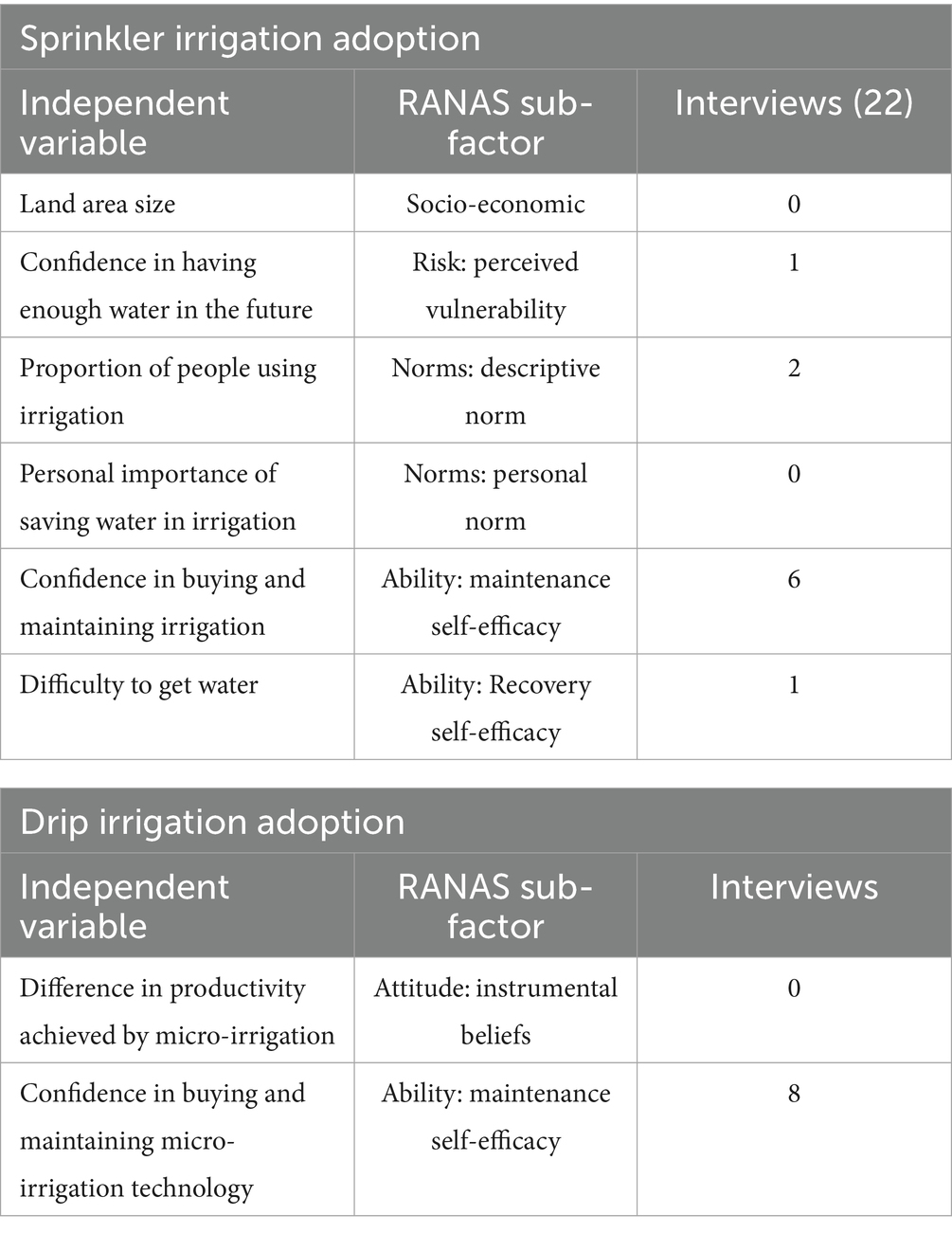
Table 7. Comparison between the significant explanatory factors identified through regression analysis for the adoption of sprinkler and drip irrigation technologies and the number of interviewees mentioning the factors as relevant.
For drip irrigation, regression analysis identified two factors crucial for explaining adoption: “Instrumental beliefs (difference in productivity achieved by micro irrigation)” and “Maintenance self-efficacy (confidence in buying and maintaining irrigation system).” Only “Maintenance self-efficacy” was also mentioned in interviews as relevant. “Difference in productivity achieved by micro irrigation” was not. This was because the ability to invest in drip irrigation outweighed the importance of the balance of costs and benefits.
3.4.2 Additional factors explaining irrigation adoption behavior
Table 8 lists factors identified from the interviews as influential for the adoption of sprinkler and drip irrigation systems, but not appearing in the regression results. Concerning sprinkler irrigation, six additional factors were identified. Four of these—“Suitability of the system to the cropping pattern,” “Market prices of crops and seeds,” “Frustration against the government,” and “Ability to invest”—were not included in the theoretical frameworks and emerged from the interviews. “Suitability of the system to the cropping pattern” highlights the importance of system applicability to specific crops. For instance, drip irrigation is more suitable for widely spaced crops such as coconut, banana, grapes and maize (Suresh Kumar and Palanisami, 2010). It is also discussed in Michie et al. (2011). “Frustration against the government” relates to low institutional trust and is also discussed by Contzen et al. (2023). The two factors included in the theoretical frameworks and that emerged from the interviews as relevant include “Ascription of responsibility” (SSBC), and “Action knowledge” (RANAS).
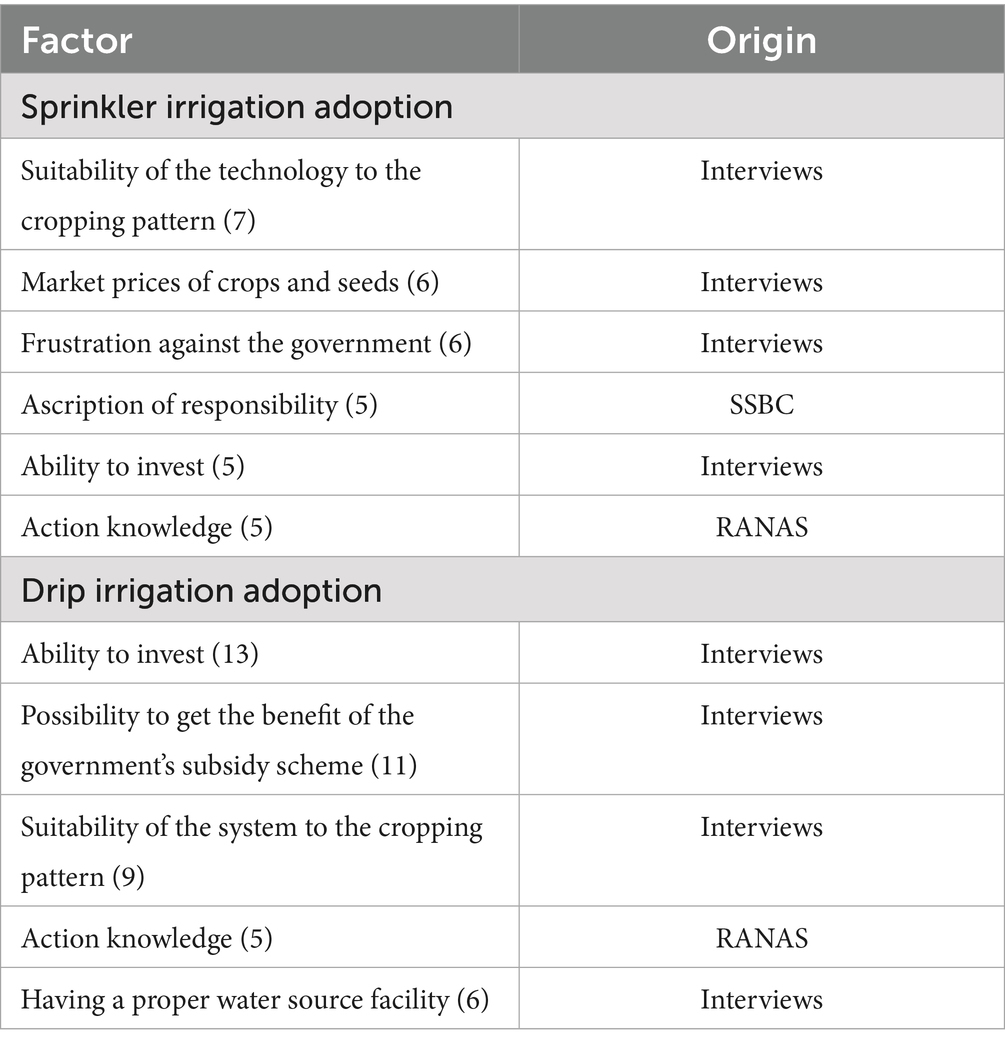
Table 8. Additional influential factors for the adoption of sprinkler and drip irrigation technologies mentioned by at least five interviewees.
For the adoption of drip irrigation technologies, five additional factors were identified in the interviews that could explain adoption, with four not originally identified in theoretical frameworks: “Ability to invest,” “Possibility to benefit from government subsidy schemes,” “Suitability of the system to the cropping pattern,” and “Availability of proper water sources.” While not explicitly recognized by the existing literature, these factors likely relate to opportunity and capability factors (Michie et al., 2011). Additionally, one factor from the RANAS framework, “Action knowledge,” was relevant in explaining adoption.
3.4.3 Descriptive statistics: average land area, total annual income, livestock count, and willingness to pay
“Ability to invest” emerged as a crucial factor influencing the adoption of micro irrigation systems, particularly drip systems, as highlighted by 13 respondents. To substantiate its significance and impact quantitatively, descriptive statistics of survey data were computed for average wealth indicators. This analysis assumed that farmers with greater financial resources are more likely to invest in and adopt drip and sprinkler irrigation systems at higher rates. The wealth indicators considered included land area, total annual income, and livestock count (Hatch et al., 2022). Additionally, factors such as “Willingness to pay” and “Confidence in buying and maintaining a micro irrigation system” were examined as psychosocial reflections on the “Ability to invest.” Table 9 presents descriptive statistics for wealth indicators and the perceptions associated with “Ability to invest,” represented by the factors “Willingness to pay” and “Confidence in buying and maintaining a micro irrigation system.”
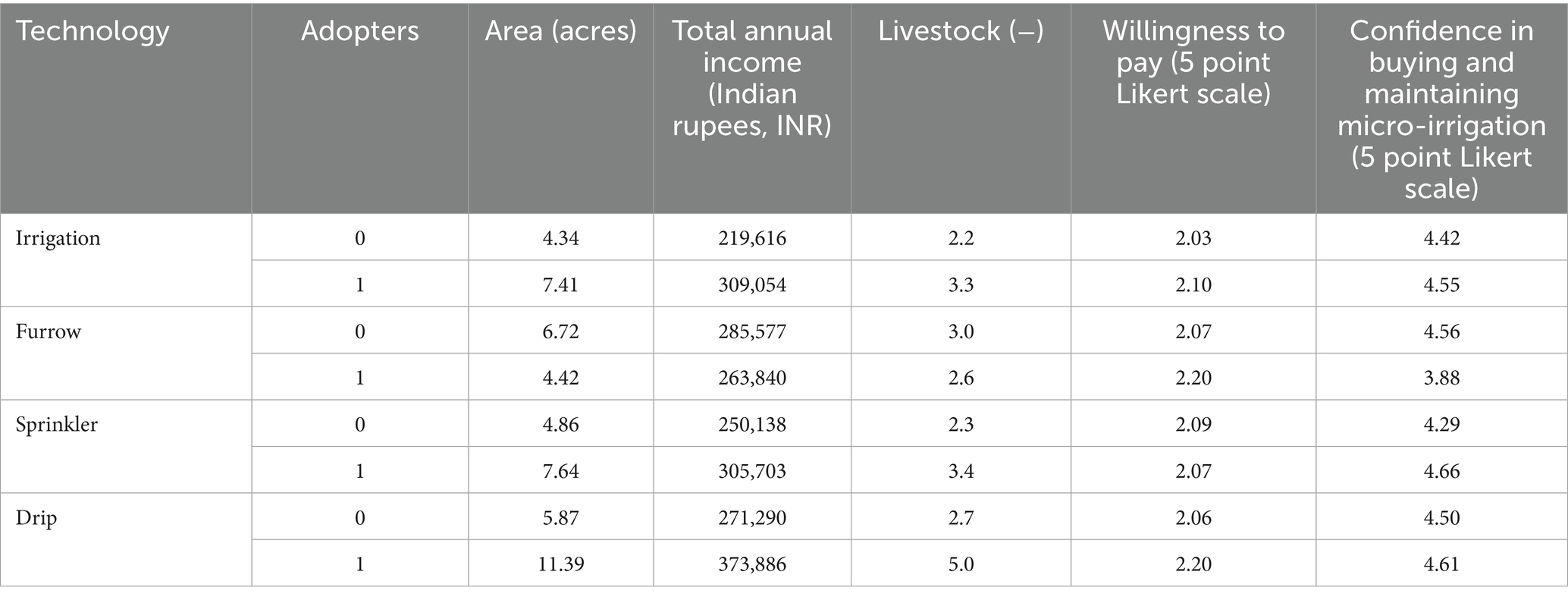
Table 9. Average values of socio-economic and psychosocial factors for adopters (1) and non-adopters (0) of specific irrigation technologies.
Farmers adopting micro-irrigation system typically possess larger farming areas and have higher total annual income and more livestock on their farms than farmers who do not practise irrigation at all, indicating higher economic capability among adopters. Those adopting furrow systems, however, are quite similar to farmers without any irrigation. Consequently, individuals with greater economic means are less inclined to adopt furrow irrigation systems.
Adopting farmers generally exhibited a greater willingness to pay for irrigation systems, except in the case of sprinkler systems. Those adopting drip and sprinkler irrigation systems also demonstrated higher confidence in purchasing and maintaining micro irrigation systems. In contrast, adopters of furrow irrigation systems tended to have lower confidence in these capabilities. In summary, financial factors are consistently associated with micro-irrigation adoption—adopters are typically more affluent, more willing to invest financially, and more confident in their abilities to buy and maintain the systems compared to those relying on furrow irrigation systems.
4 Discussion
4.1 Insights on irrigation adoption by farmers
There were several commonalities between the factors identified in the household survey, based on the RANAS model, and the factors identified in the interviews. An aversion of risk to water scarcity has been reported to influence the adoption of irrigation technologies (Jordán and Speelman, 2020; Hatch et al., 2022; Nair and Thomas, 2022; Adla et al., 2024; Gautam et al., 2024). Awareness of the risks of potential water scarcity in the future was found to influence farmers’ adoption decisions. Access to sufficient water sources was a prerequisite to irrigation and positively influenced the adoption of sprinkler irrigation in particular, as indicated by both regression analysis and the interviews. Drip irrigation required financial capacity and maintenance ability, as highlighted during interviews. Economic conditions were critical prerequisites for adoption, and adopters of drip or sprinkler irrigation systems generally were more wealthy than adopters of furrow irrigation systems, as evidenced by wealth indicators and confirmed by interviewees. The maintenance self-efficacy to buy and maintain drip irrigation was influential in adopting and sustaining drip irrigation, based on both regression and interview findings. Perceived behavioral control, corresponding to one’s self-perceived ability to perform a behavior, has been reported as significant for adoption (Castillo et al., 2021). Strong perceptions about one’s abilities to practice micro-irrigation has increased likelihood of adoption (Alam et al., 2024, for drip irrigation), also within the study region Adla et al., 2024). Descriptive norms also played a significant role in shaping the adoption of sprinkler irrigation systems, according to both regression modeling and interview responses. Interviewed farmers mentioned that observing and learning from progressive peers was influential in their decision to adopt specific irrigation methods. Descriptive and injunctive norms have been reported as influential toward the (intention toward) irrigation technology adoption (Nejadrezaei et al., 2018; Castillo et al., 2021).
In earlier studies in the same study region, psychosocial factors such as risk aversion (toward water scarcity), positive attitudes toward irrigation adoption, social influence via norms and perceived behavioral control have been reported as influential, in addition to socio-economic characteristics (Hatch et al., 2022; Adla et al., 2024).
Factors such as “Land area size” and “Personal norm (importance of saving water in irrigation)” and “Difference in productivity achieved by micro irrigation” were significant in the regression results, but not mentioned by farmers in interviews. Financial considerations emerged as more important, which is, however, correlated with “land area size.” The reason why the other two factors are not mentioned in the interview could be that the ability to invest in drip irrigation outweighed the its benefits in terms of saving water through increased water use efficiency.
There were also factors which were highlighted exclusively in the interviews and not captured by the household survey based on the RANAS model. Farmers who saw acquiring water sources or irrigation systems as primarily a government responsibility were less inclined to adopt micro-irrigation. Farmers equipped with sufficient (action) knowledge on the use of micro-irrigation systems were more likely to adopt them. The lack of knowledge and post-adoption support in maintaining irrigation has been reported as constraints for adoption and continued use (Esther Shekinah and Rakkiyappan, 2011). Multiple factors underscored farmers’ practical considerations and beliefs in obtaining subsidies, pivotal in their decision-making for micro irrigation adoption. These included “Ability to invest,” “Possibility to get the benefit of the government’s scheme,” “Having a proper water source facility,” and “Frustration against the government.” Farmers mentioned inadequate subsidies and difficulties in obtaining subsidies as factors that constrain adoption of particularly drip irrigation, as is also reported in the literature (Madhava Chandran and Surendran, 2016). The government subsidy for adopting micro-irrigation systems required farmers to have existing water sources and cover initial costs, with reimbursement only available to those selected through a lottery system (Government of India, 2018). This implies that only those with adequate capital to make investments could make use of the subsidies because they would have to pre-finance it, and it is still uncertain whether they would eventually get financial support. The challenges in this preactional stage hindered progression to subsequent stages, despite strong intentions to achieve goals. While there are recommendations toward developing a “pro-adoption environment” (including higher subsidies) to promote adoption (Castillo et al., 2021), subsidies by themselves may not be enough.
Particularly relevant results for promoting micro-irrigation are the importance of confidence in maintaining micro-irrigation, the ability to invest and, related to this, resolving the problems with pre-financing in case of (uncertain) subsidies. The high efforts needed and the uncertainty of obtaining a subsidy, combined with low trust in the government and feelings of unfairness, influence the psychological state and perceptions of farmers negatively. This has important implications for governments wanting to promote micro-irrigation: invest in extension services and design alternative subsidy schemes that can also be used by farmers with very little funds.
4.2 Strengths and limitations of the mixed-methods approach
The strengths of the mixed methods approach deployed in the study were, first, that it allowed triangulation. The results from the surveys were cross-validated by the interviews. In addition to the evidence from previous literature in the study region (Hatch et al., 2022; Adla et al., 2024), this enhanced the reliability and credibility of the findings based on different methods. Secondly, the findings from the surveys were combined with the qualitative inferences that helped to contextualize these findings. This was particularly important in understanding the role of psychosocial and contextual variables that may not have been fully captured through surveys alone. The qualitative interviews also allowed for the exploration of unexpected factors that might not have been anticipated during the design of the quantitative surveys. This flexibility helped to uncover additional insights, such as suitability of cropping patterns and the complexity of procedures of availing government subsidies.
The limitations of this study include the questionnaire design, the snowball sampling technique used, challenges in interpreting self-reported data, and the inherent limitations of the RANAS framework and logistic regression models. The questionnaire design was based on the operationalization of the RANAS framework by Hatch et al. (2022), which for some factors uses inconsistent terminology with the original framework. For instance, the term “Confidence in performance” ambiguously covered two RANAS Ability factors “Maintenance self-efficacy” and “Action knowledge.” Some other factors, such as “Willingness to pay,” did not directly correspond to RANAS factors, but were operationalized as a RANAS Attitude (Instrumental beliefs) variable.
Snowball sampling, while convenient, can introduce selection bias and may result in a sample of farmers with similar characteristics and socio-economic profiles. As a result, the sample may not be fully representative or suitable for broader application. Both the survey and interview data were self-reported, which can be less reliable compared to observable data due to potential response bias (Rosenman et al., 2011). Yet, many of the factors that can explain behavior cannot be observed directly, so we may have to accept this limitation. Further, farmers may have given socially desirable answers (Collins et al., 2005) or been influenced by the questions’ phrasing, leading to biased responses. These are also limitations that never can be ruled out completely, but we have found no evidence to suggest this was a major issue. Similarly, language issues during the interviews may have introduced some misunderstandings and noise. Finally, the interviewer’s subjective interpretation of qualitative interview information and applied coding scheme could have influenced the findings in regards to the importance of the identified additional factors.
Logistic regression analysis assumes that observations are independent, but farmers may have been influenced by others’ responses, introducing bias. Also, factors like financial situation and farmers’ abilities to invest in new technology might be correlated, violating the independence assumption. This observation was made during qualitative interviews with the farmers. Additionally, the model’s requirement for complete data led to the exclusion of many observations, reducing the sample size and potentially impacting the reliability of the results. The missing data occurred either due to loss of physical data that was noted on paper, or due to the farmers refusal to respond to a specific question. This may have had an impact on the results, because larger sample size often leads to more reliable inferences about the relationships between variables in logistic regression.
The RANAS model simplifies complex psychological factors into independent variables, helping identify levers for behavior change through surveys and regression analysis. However, this overlooks interdependencies between variables and the influence of contextual factors. Models like RANAS treat behavior and behavior change as static, failing to account variations over time. While the SSBC model identifies specific psychological and behavioral needs at different stages of change, both models lack consideration for specific cultural, environmental, socio-economic, and institutional contexts, as well as higher order effects and behavioral spill-overs (Dolan and Galizzi, 2015). Arguably, the shift from traditional irrigation practices to water saving technologies, for example, is far more complex than promoting handwashing. A better understanding of the dynamic interdependencies between individual behaviors and their social and structural context embeddings is key for effective behavior change. Recent work in psychology and behavioral science emphasizes this (Chater and Loewenstein, 2023; Hallsworth, 2023), proposing an integration of systems and behavioral science to address such complexities when analyzing behavior and designing behavior change interventions (Hale et al., 2022; Lunetto et al., 2022; Bellmann et al., 2025).
Finally, the case area considered in the study might not fully represent the broader population of farmers in Maharashtra or elsewhere, limiting the ability to generalize and scale up the results. It is important to keep these limitations in mind when interpreting the study’s outcomes and drawing conclusions about ways to address the situation.
4.3 Recommendations for future research
Future research on irrigation adoption could address several key areas to enhance understanding and improve the validity of findings. First, studies could refine and adapt existing frameworks, such as the RANAS model, to incorporate other psychosocial variables, context-specific factors and dynamic elements. These concerns can be partly addressed by using the recently developed user-centered Theory of Change (Contzen et al., 2023) which subsumes the RANAS model factors, by incorporating contextual factors, and by acknowledging the dynamic nature of adoption through behavior change process models like SSBC. Integrating the access to governmental subsidies conditionally in the quantitative analyses could also offer relevant insights.
Second, the strategy to employ mixed-methods approaches could be more holistic, and perhaps open-ended qualitative interviews can be used as a precursor to developing quantitative surveys including additional factors enhancing the operationalization of theoretical models. Alternatively, the surveys and interviews should ideally occur simultaneously to provide a clearer impression at a given point of time (Taris et al., 2021).
Third, future studies should explore alternative sampling methods and a larger sample to address the limitations of the current study. Employing random or stratified sampling and a larger sample size could be more effective in selecting a sample that is representative of the population of interest, including all relevant characteristics, and enhance the generalizability of findings (Ponto, 2015).
Lastly, researchers should consider longitudinal designs (Caruana et al., 2015) to capture the temporal dynamics of behavioral change. Tracking participants over time can reveal how the significance of various factors evolves and provide insights into the long-term impacts of interventions. This approach can also validate the dynamic aspects of theoretical frameworks, ensuring that they accurately reflect the stages of behavioral change.
5 Conclusion
Applying the RANAS model to the survey data in this study yielded insights into farmers’ behavior regarding the adoption of different irrigation technologies. Several psychosocial factors were identified that influence the adoption of irrigation technology in the Vidarbha region based on the Risk, Attitude, Norms, Ability, Self-Regulation (RANAS) model and socio-economic household data. The contextual and psychosocial determinants of irrigation technology adoption were also explored through qualitative, open-ended interviews. The correspondence of such factors with those of the Stage model of Self-regulated Behavioral Change (SSBC) that views adoption as a multi-stage process was also explored. The survey results were reinterpreted by integrating insights from the interviews to provide a comprehensive, complementary perspective on irrigation technology adoption. Following is a summary of key conclusions drawn and discussed for the farmers in the study area:
i Farmers who are concerned with the availability of their water source and believe that getting water is becoming more difficult lately may not adopt sprinkler irrigation systems.
ii Descriptive norms shape sprinkler irrigation adoption and influence farmers actions and choices.
iii Strong financial abilities and technical skills promote the adoption of sprinkler irrigation systems and relinquish traditional furrow irrigation methods.
iv A farmer’s perception of ease of access to water over the past decade influences their perception of how well they are equipped to deal with setbacks or relapses.
v Farmers’ confidence in their abilities to buy and maintain an irrigation system, i.e., their maintenance self-efficacy affects the adoption of drip irrigation technology.
vi Farmers who adopt drip or sprinkler irrigation systems are often more well-off than the ones who adopt furrow irrigation systems.
vii The ability to invest in drip irrigation outweighed the importance of saving water in general through curtailment in use or through the adoption of drip irrigation in particular through increased water use efficiency.
viii Tremendous efforts, high uncertainty of the process of getting a micro-irrigation subsidy, combined with low trust in the government, and feelings of unfairness negatively influence the psychological state and perceptions of farmers and discouraged many to adopt micro-irrigation.
The strength of the RANAS model was in deconstructing the behavioral problem into separate determinants of behavior, allowing to identify key levers for intervention. However, considering its simplified representation of a more complex reality the model inadequately addressed the varying significance of psychological factors across different stages of behavioral change. It also simplified the importance of economic and institutional constraints, which are pivotal in technology adoption. In addition to their effects on the farmers’ financial capacities and access to infrastructure and support, they also influenced farmer perceptions.
The qualitative interviews underscored the significance of context-specific factors in shaping adoption decisions. Economic stability facilitated technology adoption, while psychosocial factors could help in sustaining continued practice. A holistic view integrating earnings, expenditures, and market dynamics offered deeper insights than income metrics alone. Additionally, practical considerations such as irrigation system suitability to cropping patterns could be crucial, since cropping choices (and hence adoption) would often arise from changing environmental and market factors.
While the study is focused on a specific area in India, the mixed-method methodology as such is applicable in any setting. Other than the generic conclusion on the importance of psychosocial factors and it influencing farmer decision making in different stages of the adoption of micro irrigation technology, the results and conclusions drawn are specific to the study area. This is because psychosocial factors that influence decision making are often a function of slower changing cultural and institutional (formal and informal) factors (Daniel et al., 2022). Further research is needed in methods to generalize findings to other study areas, e.g., by also considering cultural and institutional effects on the psychosocial factors across different study areas as proposed in Daniel et al. (2022). Further, we recommend the use of longitudinal designs with more representative sampling and holistic implementation of mixed-methods to track irrigation adoption behavior over time to better explain the dynamic nature of the adoption. Finally, to promote micro-irrigation, the government should invest in extension and support services and design alternative subsidy schemes that can also be used by farmers with very little funds.
Data availability statement
The raw data supporting the conclusions of this article will be made available by the authors, without undue reservation.
Ethics statement
The studies involving humans were approved by Research Ethics Committee of the Delft University of Technology (Netherlands). The studies were conducted in accordance with the local legislation and institutional requirements. Written informed consent for participation in this study was provided by the participants’ legal guardians/next of kin. Written informed consent was obtained from the individual(s) for the publication of any potentially identifiable images or data included in this article.
Author contributions
AŠ: Conceptualization, Data curation, Formal analysis, Investigation, Methodology, Software, Validation, Visualization, Writing – original draft, Writing – review & editing. SA: Conceptualization, Formal analysis, Investigation, Methodology, Project administration, Software, Supervision, Validation, Visualization, Writing – original draft, Writing – review & editing. LS: Conceptualization, Formal analysis, Investigation, Methodology, Supervision, Validation, Visualization, Writing – original draft, Writing – review & editing. EM: Conceptualization, Investigation, Methodology, Supervision, Validation, Visualization, Writing – original draft, Writing – review & editing. SP: Conceptualization, Formal analysis, Funding acquisition, Investigation, Methodology, Project administration, Resources, Supervision, Validation, Visualization, Writing – original draft, Writing – review & editing.
Funding
The author(s) declare that financial support was received for the research and/or publication of this article. This work was supported by the Rijksdienst voor Ondernemend Nederland (NL-KVK-27378529-FDW17109IN).
Conflict of interest
The authors declare that the research was conducted in the absence of any commercial or financial relationships that could be construed as a potential conflict of interest.
Generative AI statement
The authors declare that no Gen AI was used in the creation of this manuscript.
Publisher’s note
All claims expressed in this article are solely those of the authors and do not necessarily represent those of their affiliated organizations, or those of the publisher, the editors and the reviewers. Any product that may be evaluated in this article, or claim that may be made by its manufacturer, is not guaranteed or endorsed by the publisher.
Supplementary material
The Supplementary material for this article can be found online at: https://www.frontiersin.org/articles/10.3389/frwa.2025.1519812/full#supplementary-material
References
Adla, S., Callejas Moncaleano, D. C., Alam, M. F., Daniel, D., and Pande, S. (2023). Guidelines to conduct RANAS based socio-hydrological (SH) surveys to understand behaviour. Protocols.io. Available onloine at: https://dx.doi.org/10.17504/protocols.io.rm7vzb725vx1/v1 (Accessed August 22, 2023).
Adla, S., Šaponjić, A., Tyagi, A., Nagi, A., Pastore, P., and Pande, S. (2024). Steering agricultural interventions towards sustained irrigation adoption by farmers: sociopsychological analysis of irrigation practices in Maharashtra, India. Hydrol. Sci. J. doi: 10.1080/02626667.2024.2376709
Aher, M. C., and Yadav, S. M. (2021). Assessment of rainfall trend and variability of semi-arid regions of upper and middle Godavari basin, India. J. Water Clim. Change 12, 3992–4006. doi: 10.2166/wcc.2021.044
Ahmad, S., and Hasanuzzaman, M. (Eds.) (2020). Cotton production and uses: agronomy, crop protection, and postharvest technologies. Singapore: Springer.
Ajzen, I. (1991). The theory of planned behavior. Organ. Behav. Hum. Decis. Process. 50, 179–211. doi: 10.1016/0749-5978(91)90020-T
Alam, M. F., McClain, M., Sikka, A., and Pande, S. (2024). Subsidies alone are not enough to increase adoption of agricultural water management interventions. Front. Water 6:1444423. doi: 10.3389/frwa.2024.1444423
Albarracín, D., Gillette, J. C., Earl, A. N., Glasman, L. R., Durantini, M. R., and Ho, M.-H. (2005). A test of major assumptions about behavior change: a comprehensive look at the effects of passive and active HIV-prevention interventions since the beginning of the epidemic. Psychol. Bull. 131, 856–897. doi: 10.1037/0033-2909.131.6.856
Balasubramanya, S., Buisson, M.-C., Mitra, A., and Stifel, D. (2023). Price, credit or ambiguity? Increasing small-scale irrigation in Ethiopia. World Dev. 163:106149. doi: 10.1016/j.worlddev.2022.106149
Bamberg, S. (2013). Changing environmentally harmful behaviors: a stage model of self-regulated behavioral change. J. Environ. Psychol. 34, 151–159. doi: 10.1016/j.jenvp.2013.01.002
Bandura, A. (2004). Health promotion by social cognitive means. Health Educ. Behav. 31, 143–164. doi: 10.1177/1090198104263660
Bellmann, K., de Vries, G., and Scholten, L. (2025). Understanding slow progress on urban climate adaptation: an empirical analysis of behavioural dynamics in Dutch policymaking. J. Environ. Psychol.
Bisht, I. S., Rana, J. C., and Pal Ahlawat, S. (2020). The future of smallholder farming in India: some sustainability considerations. Sustain. For. 12:3751. doi: 10.3390/su12093751
Blaise, D. (2017). “Cotton based cropping systems” in Enhancing nutrient use efficiency. eds. K. Ramesh, A. K. Biswas, B. Lakaria, S. Srivastava, and A. K. Patra (New Delhi: New India Publishing Agency (NIPA)), 369–384.
Bruce, P., Bruce, A., and Gedeck, P. (2020). Practical statistics for data scientists. 50+ essential concepts using R and Python, second. Sebastopol, CA: O’Reilly Media, Inc.
Callejas Moncaleano, D. C., Pande, S., and Rietveld, L. (2021). Water use efficiency: a review of contextual and behavioral factors. Frontiers in Water 3:685650. doi: 10.3389/frwa.2021.685650
Caruana, E. J., Roman, M., Hernández-Sánchez, J., and Solli, P. (2015). Longitudinal studies. J. Thorac. Dis. 7, E537–E540. doi: 10.3978/j.issn.2072-1439.2015.10.63
Castillo, G. M. L., Engler, A., and Wollni, M. (2021). Planned behavior and social capital: understanding farmers’ behavior toward pressurized irrigation technologies. Agric. Water Manag. 243:106524. doi: 10.1016/j.agwat.2020.106524
Castleberry, A., and Nolen, A. (2018). Thematic analysis of qualitative research data: is it as easy as it sounds? Curr. Pharmacy Teach. Learn. 10, 807–815. doi: 10.1016/j.cptl.2018.03.019
Chater, N., and Loewenstein, G. (2023). The i-frame and the s-frame: How focusing on individual-level solutions has led behavioral public policy astray. Behav. Brain Sci, 46, e147. doi: 10.1017/S0140525X22002023
Cialdini, R. B., Demaine, L. J., Sagarin, B. J., Barrett, D. W., Rhoads, K., and Winter, P. L. (2006). Managing social norms for persuasive impact. Soc. Influ. 1, 3–15. doi: 10.1080/15534510500181459
Collins, M., Shattell, M., and Thomas, S. P. (2005). Problematic interviewee behaviors in qualitative research. West. J. Nurs. Res. 27, 188–199. doi: 10.1177/0193945904268068
Contzen, N., Kollmann, J., and Mosler, H.-J. (2023). The importance of user acceptance, support, and behaviour change for the implementation of decentralised water technologies. Nat. Water, 1–13. doi: 10.1038/s44221-022-00015-y
Contzen, N., and Marks, S. J. (2018). Increasing the regular use of safe water kiosk through collective psychological ownership: a mediation analysis. J. Environ. Psychol. 57, 45–52. doi: 10.1016/j.jenvp.2018.06.008
Creswell, J. W., and Miller, D. L. (2000). Determining validity in qualitative inquiry. Theory Pract. 39, 124–130. doi: 10.1207/s15430421tip3903_2
Daniel, D., Pande, S., and Rietveld, L. (2022). Endogeneity in water use behaviour across case studies of household water treatment adoption in developing countries. World Dev. Perspect. 25, 100385. doi: 10.1016/j.wdp.2021.100385
den Besten, N. I., Pande, S., and Savenije, H. H. G. (2016). A socio-hydrological comparative assessment explaining regional variances in suicide rate amongst farmers in Maharashtra, India, Proc. IAHS, 373, 115–118. doi: 10.5194/piahs-373-115-2016
Dolan, P., and Galizzi, M. M. (2015). Like ripples on a pond: behavioral spillovers and their implications for research and policy. J. Econ. Psychol. 47, 1–16. doi: 10.1016/j.joep.2014.12.003
Dongre, A. R., and Deshmukh, P. R. (2012). Farmers’ suicides in the Vidarbha region of Maharashtra, India: a qualitative exploration of their causes. J. Inj. Violence Res. 4, 2–6. doi: 10.5249/jivr.v4i1.68
Esther Shekinah, D., and Rakkiyappan, P. (2011). Conventional and microirrigation Systems in Sugarcane Agriculture in India. Sugar Tech 13, 299–309. doi: 10.1007/s12355-011-0113-1
Frick, J., Kaiser, F. G., and Wilson, M. (2004). Environmental knowledge and conservation behavior: exploring prevalence and structure in a representative sample. Personal. Individ. Differ. 37, 1597–1613. doi: 10.1016/j.paid.2004.02.015
Gautam, T. K., Paudel, K. P., and Guidry, K. M. (2024). Determinants of irrigation technology adoption and acreage allocation in crop production in Louisiana, USA. Water 16:392. doi: 10.3390/w16030392
Gollwitzer, P. M., and Sheeran, P. (2006). “Implementation intentions and goal achievement: a meta-analysis of effects and processes” in Advances in experimental social psychology (New York, NY, USA: Academic Press), 69–119.
Government of India (2018). Micro irrigation fund. India: Ministry of Agriculture and Farmers’ Welfare, Government of India. Available online at: https://govtschemes.in/sites/default/files/2022-10/Micro%20Irrigation%20Fund%20Guidelines.pdf (Accessed August 15, 2023).
Hale, J., Jofeh, C., and Chadwick, P. (2022). Decarbonising existing homes in Wales: a participatory behavioural systems mapping approach. UCL Open Environ. 4. doi: 10.14324/111.444/ucloe.000047
Hallsworth, M. (2023). A manifesto for applying behavioural science. Nat Hum Behav, 7, 310–322. doi: 10.1038/s41562-023-01555-3
Hammer, D., and Wildavsky, A. (2018). “The open-ended, semistructured interview: an (almost) operational guide” in Craftways (Routledge).
Hatch, N. R., Daniel, D., and Pande, S. (2022). Behavioral and socio-economic factors controlling irrigation adoption in Maharashtra, India. Hydrol. Sci. J. 67, 847–857. doi: 10.1080/02626667.2022.2058877
Heckhausen, H., and Gollwitzer, P. M. (1987). Thought contents and cognitive functioning in motivational versus volitional states of mind. Motiv. Emot. 11, 101–120. doi: 10.1007/BF00992338
Hesse-Biber, S., and Leavy, P. (2004). Approaches to qualitative research: a reader on theory and practice. New York, NY: Oxford University Press.
Hussain, S., Ahmad, A., Wajid, A., Khaliq, T., Hussain, N., Mubeen, M., et al. (2020). “Irrigation scheduling for cotton cultivation” in Cotton production and uses: agronomy, crop protection, and postharvest technologies. eds. S. Ahmad and M. Hasanuzzaman (Singapore: Springer), 59–80.
ICAR (2024). Maharashtra | ICAR. Indian Council of Agricultural Research. Ministry of Agriculture and Farmers Welfare. Available online at: https://icar.org.in/node/17272 (Accessed June 5, 2024).
Jordán, C., and Speelman, S. (2020). On-farm adoption of irrigation technologies in two irrigated valleys in Central Chile: the effect of relative abundance of water resources. Agric. Water Manag. 236:106147. doi: 10.1016/j.agwat.2020.106147
Keller, E., Eisen, C., and Hanss, D. (2019). Lessons learned from applications of the stage model of self-regulated behavioral change: a review. Front. Psychol. 10. doi: 10.3389/fpsyg.2019.01091
Khadi, B. M., Santhy, V., and Yadav, M. S. (2010). “Cotton in India” in Cotton - biotechnological advances (Berlin, Heidelberg: Springer Berlin Heidelberg), 15–44.
Krejcie, R. V., and Morgan, D. W. (1970). Determining sample size for research activities. Educ. Psychol. Meas. 30, 607–610.
Kumar, M., and Rath, S. K. (2016). “Chapter 15 - feature selection and classification of microarray data using machine learning techniques” in Emerging trends in applications and infrastructures for computational biology, bioinformatics, and systems biology. eds. Q. N. Tran and H. R. Arabnia (Boston: Morgan Kaufmann), 213–242.
Lee, B. X., Kjaerulf, F., Turner, S., Cohen, L., Donnelly, P. D., Muggah, R., et al. (2016). Transforming our world: implementing the 2030 agenda through sustainable development goal indicators. J. Public Health Policy 37, 13–31. doi: 10.1057/s41271-016-0002-7
Leighton, K., Kardong-Edgren, S., Schneidereith, T., and Foisy-Doll, C. (2021). Using social media and snowball sampling as an alternative recruitment strategy for research. Clin. Simul. Nurs. 55, 37–42. doi: 10.1016/j.ecns.2021.03.006
Lincoln, Y. S., and Guba, E. G. (1985). Naturalistic inquiry | SAGE publications Inc. Newbury Park, London, New Delhi: SAGE Publications, Inc. Available online at: https://us.sagepub.com/en-us/nam/naturalistic-inquiry/book842 (Accessed June 12, 2024).
Lunetto, M., Hale, J., and Michie, S. (2022). Achieving effective climate action in cities byunderstanding behavioral systems. One Earth 5, 745–748. doi: 10.1016/j.oneear.2022.06.009
Madhava Chandran, K., and Surendran, U. (2016). Study on factors influencing the adoption of drip irrigation by farmers in humid tropical Kerala, India. Int. J. Plant Prod. 10, 347–364. doi: 10.22069/ijpp.2016.2902
Michie, S., van Stralen, M. M., and West, R. (2011). The behaviour change wheel: a new method for characterising and designing behaviour change interventions. Implement. Sci. 6:42. doi: 10.1186/1748-5908-6-42
Ministry of Textiles (2022). Annexure-vii: Cotton sector. Govt. of India. Available online at: https://www.texmin.nic.in/sites/default/files/Cotton%20Sector.pdf
Mosler, H.-J. (2012). A systematic approach to behavior change interventions for the water and sanitation sector in developing countries: a conceptual model, a review, and a guideline. Int. J. Environ. Health Res. 22, 431–449. doi: 10.1080/09603123.2011.650156
Mosler, H.-J., and Contzen, N. (2016). Systematic behavior change in water, sanitation and hygiene. a practical guide using the RANAS approach. Version 1.1.: Swiss Agency for Development and Cooperation SDC.
Murat, M. (2023). Logistic regression equations. Odds ratios. Available online at: https://mmuratarat.Github.io/2019-09-05/odds-ratio-logistic-regression (Accessed July 2, 2023).
Nair, S. C., and Mirajkar, A. B. (2021). Spatio–temporal rainfall trend anomalies in Vidarbha region using historic and predicted data: a case study. Model. Earth Syst. Environ. 7, 503–510. doi: 10.1007/s40808-020-00928-1
Nair, J., and Thomas, B. K. (2022). Why is adoption of micro-irrigation slow in India? A review. Dev. Pract. 33, 1–11. doi: 10.1080/09614524.2022.2059065
Namara, R. E., Nagar, R. K., and Upadhyay, B. (2007). Economics, adoption determinants, and impacts of micro-irrigation technologies: empirical results from India. Irrig. Sci. 25, 283–297. doi: 10.1007/s00271-007-0065-0
Nejadrezaei, N., Allahyari, M. S., Sadeghzadeh, M., Michailidis, A., and El Bilali, H. (2018). Factors affecting adoption of pressurized irrigation technology among olive farmers in northern Iran. Appl Water Sci 8:190. doi: 10.1007/s13201-018-0819-2
Pande, S., and Savenije, H. H. G. (2016). A sociohydrological model for smallholder farmers in Maharashtra, India. Water Resour. Res. 52, 1923–1947. doi: 10.1002/2015WR017841
Parker, C., Scott, S., and Geddes, A. (2019). Snowball sampling. SAGE Research Methods Foundations. Available online at: http://methods.sagepub.com/foundations/snowball-sampling (Accessed June 21, 2024).
Pathak, H. S., Brown, P., and Best, T. (2019). A systematic literature review of the factors affecting the precision agriculture adoption process. Precision Agric 20, 1292–1316. doi: 10.1007/s11119-019-09653-x
Rahman, M. H., Ahmad, I., Ghaffar, A., Haider, G., Ahmad, A., Ahmad, B., et al. (2020). “Climate resilient cotton production system: a case study in Pakistan” in Cotton production and uses: agronomy, crop protection, and postharvest technologies. eds. S. Ahmad and M. Hasanuzzaman (Singapore: Springer), 447–484.
Reddy, A. A., Raju, S., and Bose, A. (2020). Farmers’ income, indebtedness and agrarian distress in India. Microf. Rev. 12, 20–38.
Rosenman, R., Tennekoon, V., and Hill, L. G. (2011). Measuring bias in self-reported data. Int. J. Behavi. Healthcare Res. 2:320. doi: 10.1504/IJBHR.2011.043414
RVO (2022). Water efficiency in sustainable cotton-based production systems in Maharashtra, India. Netherlands: Netherlands Enterprise Agency. Available online at: https://projects.rvo.nl/project/nl-kvk-27378529-fdw17109in/ (Accessed August 15, 2023).
Šaponjić, A. (2023). Understanding farmers’ micro-irrigation adoption behaviour: a case study in Maharashtra, India. Delft: Delft University of Technology.
Schultz, P. W., Nolan, J. M., Cialdini, R. B., Goldstein, N. J., and Griskevicius, V. (2007). The constructive, destructive, and reconstructive power of social norms. Psychol. Sci. 18, 429–434. doi: 10.1111/j.1467-9280.2007.01917.x
Schwartz, S. H., and Howard, J. A. (1981). A Normative Decision-Making Model of Altruism. In Rushton, J.P. and Sorrentino, R.M. (eds.)Altruism and Helping Behavior: Social, Personality and Developmental Perspectives. Hillsdale: Lawrence Erlbaum Associates, pp. 189–212.
Schwarzer, R. (2008). Modeling health behavior change: how to predict and modify the adoption and maintenance of health behaviors. Appl. Psychol. 57, 1–29. doi: 10.1111/j.1464-0597.2007.00325.x
Shibly, H. R., Abdullah, A., and Murad, M. W. (2022). “Research framework for technology adoption” in ERP adoption in organizations: The factors in technology acceptance among employees. eds. H. R. Shibly, A. Abdullah, and M. W. Murad (Cham: Springer International Publishing), 103–148.
Sikka, A. K., Alam, M. F., and Mandave, V. (2022). Agricultural water management practices to improve the climate resilience of irrigated agriculture in India. Irrig. Drain. 71:ird.2696. doi: 10.1002/ird.2696
Suresh Kumar, D., and Palanisami, K. (2010). Can drip irrigation technology be socially beneficial? Evidence from southern India. Water Policy 13, 571–587. doi: 10.2166/wp.2010.311
Taris, T. W., Kessler, S. R., and Kelloway, E. K. (2021). Strategies addressing the limitations of cross-sectional designs in occupational health psychology: what they are good for (and what not). Work Stress 35, 1–5. doi: 10.1080/02678373.2021.1888561
Tobias, R. (2009). Changing behavior by memory aids: a social psychological model of prospective memory and habit development tested with dynamic field data. Psychol. Rev. 116, 408–438. doi: 10.1037/a0015512
Van Halsema, G. E., and Vincent, L. (2012). Efficiency and productivity terms for water management: a matter of contextual relativism versus general absolutism. Agric. Water Manag. 108, 9–15. doi: 10.1016/j.agwat.2011.05.016
van Wirdum, C., Hatch, N. R., Ali, M. Y. A. M., Raghunathan, P., and Willard, T. (2019). Multidisciplinary project cotton water: Baseline study of designing sustainable instruments for smallholders in Maharashtra, India. Delft: Delft University of Technology. Available online at: http://resolver.tudelft.nl/uuid:16fc0b0b-72e6-47da-9a91-2305adf65e58 (Accessed January 9, 2022).
Venot, J.-P., Kuper, M., and Zwarteveen, M. (Eds.) (2017). Drip irrigation for agriculture: untold stories of efficiency, innovation and development. London: Routledge.
Weersink, A., and Fulton, M. (2020). Limits to profit maximization as a guide to behavior change. Appl. Econ. Perspect. Policy 42, 67–79. doi: 10.1002/aepp.13004
World Bank (2022a). Employment in agriculture (% of total employment) (modeled ILO estimate) - India. International Labour Organization. “ILO modelled estimates database” ILOSTAT. Available online at: https://data.worldbank.org/indicator/SL.AGR.EMPL.ZS?locations=IN&skipRedirection=true (Accessed August 15, 2023).
Keywords: farmers, irrigation adoption, behavioral psychology, RANAS behavioral model, SSBC behavioral model
Citation: Šaponjić A, Adla S, Scholten L, Mostert E and Pande S (2025) Combining household surveys and interviews to understand irrigation technology adoption among farmers in Maharashtra (India). Front. Water. 7:1519812. doi: 10.3389/frwa.2025.1519812
Edited by:
Suparana Katyaini, Council on Energy, Environment and Water (CEEW), IndiaReviewed by:
Ahmed Abdelhafez, The New Valley University, EgyptDivya Solomon, Cornell University, United States
Copyright © 2025 Šaponjić, Adla, Scholten, Mostert and Pande. This is an open-access article distributed under the terms of the Creative Commons Attribution License (CC BY). The use, distribution or reproduction in other forums is permitted, provided the original author(s) and the copyright owner(s) are credited and that the original publication in this journal is cited, in accordance with accepted academic practice. No use, distribution or reproduction is permitted which does not comply with these terms.
*Correspondence: Saket Pande, cy5wYW5kZUB0dWRlbGZ0Lm5s
 Anja Šaponjić
Anja Šaponjić Soham Adla
Soham Adla Lisa Scholten
Lisa Scholten Erik Mostert
Erik Mostert Saket Pande
Saket Pande